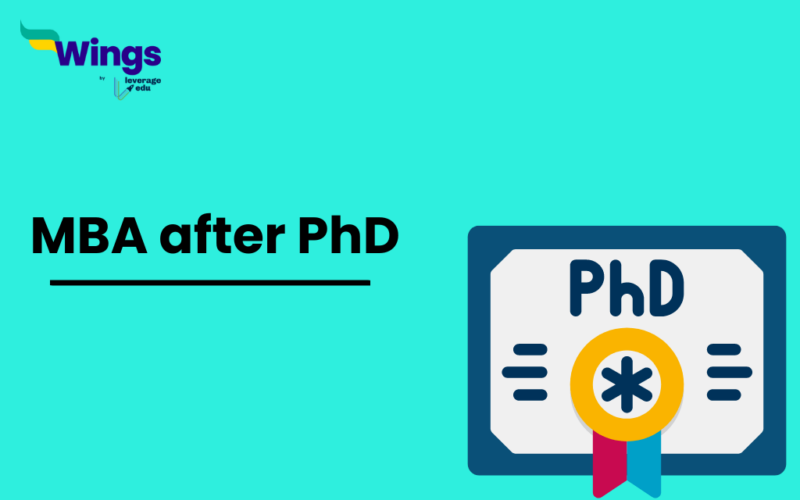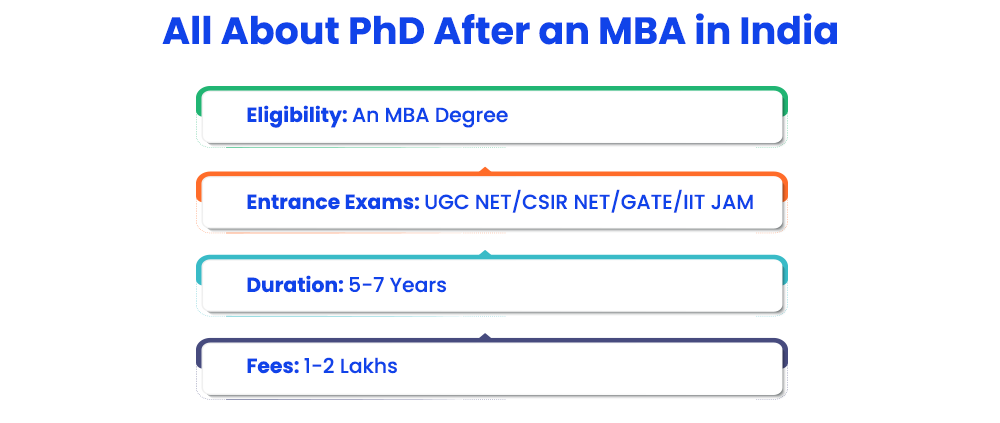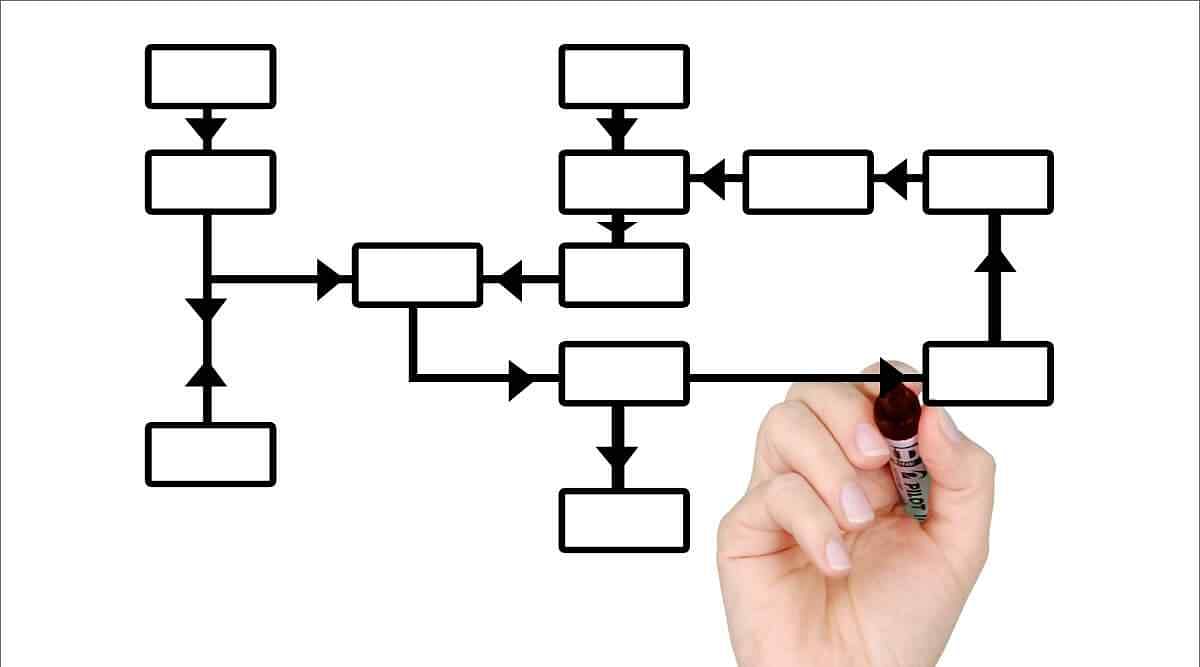Is it Possible to Get My PhD After My MBA?

In academia, numerous accomplishments can be achieved. You can earn a dual degree and have expertise in multiple fields, or further your career potential by going back to school . But what about progressing from an MBA to a PhD?
In regards to higher education, many consider earning a PhD, or doctorate degree, the pinnacle of success. Usually, due to passion for a particular industry or subject, a PhD candidate will spend years of rigorous research to unpack its intricacies and become a leading expert in the field. At the end of their studies, they are able to finally see their work come to fruition when they receive their doctorate and join alongside other scholars. However, is it typical for an MBA graduate to move onto pursuing their PhD? And is there a specific purpose? Are there different types of PhD programs? What is the difference between a PhD and DBA?
To answer the budding question: yes, you can pursue your PhD after earning your MBA, and choosing to earn a doctorate is entirely up to you and your aspirations. To help you better understand if getting a PhD is the right choice, we look at the path an MBA graduate can take to earn their PhD, one of the higher purposes of a doctorate, and the different types of academic programs.

What is a PhD, and What is it Used For?
By definition, a PhD is a Doctor of Philosophy in a particular discipline, which is why it's also referred to as a doctorate. This focus is typically for individuals highly passionate about a specific subject matter, driven by the pursuit to understand it better through rigorous research. A majority of students seeking their PhD are eager researchers, although there are always exceptions, and each carries out years of highly intensive research to conclude their original thesis and earn their doctorate.
In terms of translating your education into a career, a doctorate can be used in a plethora of fields, especially if one’s thesis is around a wider subject matter and can be a discipline applied to various industries (take organizational development, for example). For those who are passionate about a career in research, a doctoral degree is a perfect fit. Possibly the most popular field for those with a doctorate is a fruitful career in academia, teaching their subject matter to others interested in the same area. Many graduates become faculty members at business schools upon completing their PhD and provide their expertise to their students. Regardless of which industry you choose, you can be assured that a PhD will provide you with numerous opportunities.
How Long Does it Take to Progress from an MBA to PhD?
The timeframe for earning your PhD can vary depending on program and location. Many countries have varying timelines of how long the completion of a doctoral program will take. In the United States, the average is around 4-5 years of completion after receiving your Master of Business Administration.
Do You Need an MBA to Get a PhD?
To be accepted into a doctoral program, you must have a master’s degree. It does not have to be a Master of Business Administration, but it does need to be a master’s of some form. Depending on your area of specialization, it could be advantageous to earn your MBA in pursuit of a PhD if you are planning to embark on a career in business upon completion of your doctorate. Additionally, one important aspect to consider is the program itself. It is important to look into a program’s requirements before applying to meet the eligibility criteria.
The Difference Between a DBA and a PhD
For those specifically interested in a career in business, a Doctor of Business Administration (DBA) is a highly beneficial doctoral program. A DBA focuses on a broader spectrum of business disciplines, dedicating research toward multiple corporate facets, and practical implementation. On the contrary, a PhD narrows into a specific area of discipline and research, emphasizing theory, and it’s potential implications. While both are heavily centered around research and implementation, a DBA sets business executives and leaders on a path to discover new possibilities for their organizations and businesses. In a way, it allows established business professionals to “trailblaze” the way for new and innovative ideas that can disrupt the market and set a precedent for the future of business.
Get Your MBA or DBA at Pepperdine Graziadio Business School
At Pepperdine Graziadio, we proudly offer degrees to accommodate business professionals at any stage of their lives and careers. Our full and part-time MBA programs are designed to prepare candidates for a successful career in values-based business leadership. All of our MBA programs offer a personalized learning approach executed by our world-class faculty. Each program is characterized by its top-ranked business curriculum that can be coupled with an academic concentration.
Our Executive Doctor of Business Administration (DBA) program has been carefully designed for the tenured business leader looking to drive groundbreaking innovations. This rigorous program allows candidates to gain in-depth knowledge and finetune their expertise through applied research. Also, executives enjoy learning alongside changemakers in various industries and participating in exclusive opportunities available only to DBA candidates.
Learn more about which programs fit your career aspirations and academic interests.
Learn more about how to achieve your career goals with a degree from Pepperdine Graziadio Business School.
Help Us Shape the Content You Love:
Blog Topic Feedback Survey.
Pick the topics you love from the dropdown menus below.
Select the topic that most interests you.
Additional Suggested Topic
- Student Life
- Graduate Programs
- Center for Applied Research
- Master's Degree
- Faculty Research
- Sustainability
- Entrepreneurship
- Talent Management
- Part-Time MBA
Copyright © 2024 Pepperdine University
- Privacy Policy
- GDPR Privacy Notice
- Clery Notice
- Terms of Use
- Title IX
- Web Accessibility
- SUGGESTED TOPICS
- The Magazine
- Newsletters
- Managing Yourself
- Managing Teams
- Work-life Balance
- The Big Idea
- Data & Visuals
- Reading Lists
- Case Selections
- HBR Learning
- Topic Feeds
- Account Settings
- Email Preferences
Why a Doctorate in Business Administration Is Becoming More Valuable
Sponsor content from upGrad.

At the turn of the 20th century, the world was industrializing at a rapid pace. Businesses were growing larger and more complex, with more employees working in more diversified divisions spread across more geographical boundaries.
As a result, demand grew for people who had special training in managing the general operations of a business, which led to the creation and proliferation of the Master of Business Administration (MBA) degree.
More than 100 years later, MBAs have become a commodity that no longer serve organizations’ core needs.
In today’s age of data and information, knowledge has become the most valuable resource. Companies don’t necessarily need more general managers who can assess broad patterns across multiple industries—they need people with deep expertise in specific domains who can analyze data and generate unique insights that lead to better business decisions.
That’s why Doctorate in Business Administration (DBA) holders are becoming increasingly valuable in the modern workplace.
DBA is a professional degree representing the highest level of qualification in management. In contrast to an MBA, it takes students on a different path toward acquiring and using business knowledge.
For an MBA, students spend two years taking a broad range of practical courses to learn about several pillars of business—such as accounting, finance, marketing, leadership, operations, strategy, and ethics—to help them become effective leaders across many industries.
By contrast, DBAs spend up to two years studying academic literature across several domains and up to two additional years designing and executing an original research project: a dissertation focused on one domain. The primary goal of a DBA is to produce scholarly individuals who have deep expertise in a field of management.
When seeking executive-level positions, DBAs’ “Dr.” titles are likely to help them stand out from their peers. DBAs can also pursue high-level positions in areas such as consulting by becoming subject-matter experts—or maintain ties with academia as full-time or adjunct professors.
DBAs’ training gives them diverse career options. The academic literature they read gives them expertise in understanding management theories that can help them analyze real-world situations and differentiate the signal from the noise. A DBA specializing in innovation can assess whether newcomers to a market pose a credible threat as a disruptive innovation to an existing company.
Students then learn advanced scientific techniques in quantitative and/or qualitative methodologies, which trains them in analyzing data to generate valid inferences that their organizations can use for decision-making purposes. Rather than relying on gut feel and graphs, DBAs can use powerful techniques such as sampling data to reduce bias, using statistical regressions to identify the strongest factors that influence an outcome, or designing an experiment to gain 100% certainty over the causal relationship between variables.
Finally, DBAs combine their business knowledge with analytical skills to design and execute original research studies, making them the world’s leading experts in particular domains.
DBAs also stand out because they represent only 2% of all people who hold higher degrees in business. In 2021, more than 250,000 students graduated with MBAs or specialist degrees in business; only 5,000 graduated with doctorates.
While a DBA may represent an attractive option that can be highly valuable to organizations today, they are not necessarily recommended for everyone.
To help you determine whether a DBA is right for you, the most important question to ask yourself centers on whether you’re satisfied with the tools and frameworks you use to analyze data and information to make important business decisions. If you’ve ever found yourself wondering where these frameworks come from—or whether there might be a better way to make decisions—consider applying to a DBA program. These programs are designed to channel deep intellectual interests and passions toward producing business knowledge that’s both theoretically novel and practically relevant.
DBA training may help you develop deeper knowledge than an MBA program will while opening doors to more ambitious careers in industry or academia. While MBA degrees are designed to meet the needs of 20th-century businesses, DBAs can help meet the needs of organizations today—and well into the future.
Learn more about how earning a DBA can help you step up your career.

Can You Do a PHD After an MBA? Pros and Cons.
As an MBA graduate, I considered whether to obtain a more specialized degree or go for any job in the very tough job market. I thought about Ph.D. too. Here I lay out my thoughts based on experience and research I made for myself on this topic.
You can do a Ph.D. after MBA, but it is unnecessary for a solid career in business. Ph.D. after MBA may provide a valuable leverage tool for your scientific job if you want to go deeper into any field of science, including technical or social science.
In most instances, you obtaining a Ph.D. after MBA does not make sense. But in a few cases, Ph.D. after MBA may offer new opportunities. Let us analyze below when receiving a Ph.D. after MBA may make sense at all.
Is MBA higher than a Ph.D.?
MBA is a master’s degree, while a Ph.D. is a doctorate. Ph.D. is a higher degree than MBA. Therefore, some MBA students or graduates may decide to take their education to the next level and go into a Ph.D. program.
Does a Ph.D. guarantee a job?
Here are the negatives if you do Ph.D. after MBA. Having MBA and Ph.D. alone will not necessarily make you more employable. It may limit your employment options to a narrow field. Choose carefully. And being a Ph.D. means that you will be overqualified for most starting positions in the industry (with a caveat, read below).
Secondly, MBA and then Ph.D. on your CV may raise many flags if you decide to change your career or industry in the future. The sooner you want to change your career, the worse it will look. The question would be: “you did your MBA, then you did your Ph.D. after an MBA…do you know what you are doing?”
A ph.D. is not necessarily helpful for a career. Some people go for Ph.D. because they want to become professors teaching classes in universities. But professor jobs are scarce, and with lower college enrolments, it is becoming increasingly hard to find a teaching job. In short: YOU WILL NOT FIND A TENURED PROFESSOR JOB AFTER Ph.D. ANYMORE . Hopefully, I made that clear enough.
On the other hand, PhDs may be valued by different exiting or emerging educational institutions, including those private ones, providing online programs or courses.
In my humble opinion Ph.D. often should be pursued in the area in which you have a strong urge and desire to work for the next couple of decades doing research.
Because getting a Ph.D. is quite a pain, it takes years, and you will be grossly underpaid while doing it. I would also look at the demand for specialists in the respective field of your Ph.D.
Getting into a top Ph.D. university program is challenging. Often, they require terminal degrees like MSC, MA, MS rather than MBA. Therefore, instead of Ph.D. MBA graduates may go for a DBA and still get into corporate world management after that.
Still, PhDs can get a job in the industry because they have a solid reputation as research and analysts.
I suggest that if you decide to pursue Ph.D., make sure that your field of research is congruent with your previous MBA degree, other education, work, or relevant experience valuable to a potential employer. Congruency will bind everything together nicely, total leverage.
But read on to find out which Ph.D. I think it may be helpful in your career. Please do not take my word for it, as I believe the global economy is changing rapidly. Yet, I see some strong trends that are likely to continue for decades ahead, presenting some viable Ph.D. career options.
Note that academia is saturated, and even PhDs have a hard time finding academic jobs. Said that Ph.D. could take even a master’s level position or other senior position in the industry if his or her Ph.D. area is a good match.
If you decide to obtain Ph.D. after MBA, then I suggest choosing a topic that can have practical application in the industry for better transition and good pay.
There are many practical fields for Ph.D. after MBA.
Which Ph.D. after an MBA may be a good option?
Ph.D. is a heavily research-oriented degree. By researching, a Ph.D. student divulges very deep into the narrow topic, like in a rabbit hole, and becomes a super-expert in that topic.
Thus, selecting a Ph.D. topic for future employment is a significant decision for an MBA student. Because you already have spent 2-4 years getting an MBA degree. Now, what will 5-6 years of Ph.D. give you at this point?
I think Ph.D. is an excellent choice for those MBA’s who want to go into science. Ph.D. makes a person quite employable in science, especially if that science field is related to MBA or previous work or educational experience.
Note, when I say science, in addition to natural sciences, I also mean new types of science. That includes fields like data science, or AI or machine learning, social science.
If you check any major job site, it will tell you a complete story about whether it makes sense to get your Ph.D. after MBA. For example, MBA in finance, economics, or statistics from a reputable business school plus a Ph.D. in finance, economics, statistics, or mathematics may help you find an exciting position in one of the major league financial institutions, hedge funds, or banks. Why? Because these fields are practical rather than purely theoretical.
Ph.D. after MBA Specific Examples
If you are keen on coding and have some programming or engineering background, and as an MBA, you want to switch into a niche of machine learning or AI in business industries, you may get your Ph.D. in AI or machine learning. That still can get you hired in the financial sector if you want because the financial sector uses AI and machine learning a lot these days.
MBA in finance, economics, or accounting, coupled with a Ph.D. in AI or machine learning, may present you as a valuable candidate in the modern digital high-tech world of finance and the business field generally.
Recruiters are pretty mechanical sometimes. They see MBA on top of the relevant work experience and assume you can potentially hold a managerial position far from the truth.
Note that you will need a programming work background and a Ph.D. in those tech areas if you want to go this route. But salaries can be pretty lucrative – in hundreds of thousands of dollars per year.
If you type “Ph.D.” and “MBA” in a search field on any major job search engine (site), you will see that some positions show a preference for someone with an MBA and Ph.D. in some analytical or quantitative field.
You will see demand in some quite exotic narrow fields like revenue science or equity research, social science. Often positions require natural science or programming-related Ph.D., but there is a fair share of those require Ph.D. in either quantitative or business topics. Hence, let us see which type of Ph.D. is better for MBA students.
Does it help to obtain a business-related Ph.D. after MBA?
Obtaining a business-related Ph.D. after an MBA may provide some value for those who want to go deeper into research or teaching in the business area. For example, a Ph.D. in organizational behavior management may help you land a job in fields anywhere from social science to HR.
MBA + Ph.D. in economics or finance with quantitative aspect may land you an analytical or lead job in a significant financial institution or international organization. But note that PhDs in economics and finance maybe a little bit saturated in the job market.
Actuarial sciences or accounting fields also hire PhDs. Check your local job search engine for details.
I have heard that Ph.D. in accounting is a relatively undersaturated area, and companies are happy to hire accounting PhDs with accounting work experience. Underlying MBA in such a case may be an excellent background addition to a resume showing managerial ability.
I have also heard about companies hiring PhDs in Global Leadership and Change, for example. I am not sure what their practical managerial work background was, but it must have been extended for such a position. Ph.D. was likely just significant leverage on his or her CV.
Other areas of potential employment and thus Ph.D. research topics can include business development, business strategy, strategy management, competitive intelligence, and more.
If you have read some of my other blog posts related to business education, you probably noticed that I am a proponent of practical, specific, education which gives specific tangible skills.
That is why I am a proponent of going deeper into quantitative areas of education. Quantitative are very transferrable skills. Smart, introverted people with quantitative skills may have a better shot at a fascinating, well-paying analytical job.
Other avenues for MBA and Ph.D. holders
For example, have you heard of such an exotic path as quantitative marketing? Now you did. Marketing analytics can involve quite a bit of calculation and data mining. Ph.D. in quantitative marketing after MBA can land you a job in a financial, economics, or marketing type of position, just because of the quantitative aspect of that type of Ph.D.
Note that many quantitative Ph.D. programs in reputable institutions require quantitative background or education. For example, Ph.D. in finance may require a background MBA in finance, economics, or mathematics.
Did you know that social science is considered a STEM area? I found at least one position requiring a Ph.D. in social science with MBA.
The most important note is that you must LOVE the subject or broad field of your Ph.D. Otherwise, it does not make sense to pursue one because you will drop out anyway.
One major caveat for obtaining a Ph.D. after MBA is that employers quite often also want multi-year practical work experience in a related area. Therefore, seeking valuable work experience is a better strategy than obtaining a Ph.D. after MBA. But everything has its exceptions, especially for quantitative types of jobs.
Here is an excellent video by the Ph.D. professor about the pros and cons of doing a Ph.D. after an MBA.
How long to get a Ph.D. after an MBA?
On average, Ph.D. after an MBA takes 4-5 years to complete.
Conclusion.
If you want to obtain Ph.D. after MBA, then you need to think it through. I mean, you must be a thinker and researcher at this point. Check job sites, talk to your professors, other students. See what they say about potential opportunities for MBA/PhDs.
Would I do it? Probably not. Unless it would be a heavily quantitative area with potential practical industry application in finance or technology, if anything, I would instead go for a specialized MS in the subject area related to MBA or technology.
But that is only my 5 cents. Your goals may be different.
Some sources .
Stack Exchange Network
Stack Exchange network consists of 183 Q&A communities including Stack Overflow , the largest, most trusted online community for developers to learn, share their knowledge, and build their careers.
Q&A for work
Connect and share knowledge within a single location that is structured and easy to search.
Is it useful to do an MBA after PhD?
I have heard of people who have gone on to pursue an MBA after their doctorates. What are the advantages/downsides of this?
Wouldn't the companies recruiting them after MBA value their doctorate experience less compared to the experience gained at an MNC? Is there a risk of them being valued as "failed" doctorates?
- graduate-school
- business-school
- 6 MBAs and PhDs are two different things. If you want to run a business, do an MBA. – Dave Clarke Commented Jun 1, 2012 at 8:24
- It really depends on the degree and what you ultimately intend to do... What do you plan to get your PhD in, and how do you plan to use an MBA as part of your future plans? – Paul Commented Jun 2, 2012 at 14:13
- 1 Nature just had an article about it: nature.com/naturejobs/science/articles/10.1038/nj7523-523a – Gimelist Commented Nov 4, 2014 at 22:39
4 Answers 4
There are several cases where PhDs do an MBA. Some of them are:
- Bored of research as a whole.
- Irritation with academia and poor scope in Industry.
- Want to earn money.
- For furthering responsibilities at the university where one is a professor. If you do some looking around, a high amount of Deans to have an MBA along with a PhD.
No degree ever goes waste. Most people with PhD and MBA acquire director positions in companies.
- 26 "no degree ever goes waste" [citation needed] – JeffE Commented Jun 2, 2012 at 5:43
- 1 "Most people with PhD and MBA acquire director positions in companies." That seems insanely hard to believe. – xLeitix Commented Jan 4, 2014 at 16:07
A qualification regardless of level and field of study is never a waste, one needs to realize how to use it wisely and appropriately. As we navigate life we shift perspective and interests, our education choices therefore need to reflect this. Ph.D provides sound research focus, MBA provides sound business and leadership focus. The two combined is a great and electrifying combination.
- 4 A qualification regardless of level and field of study is never a waste — [citation needed] – JeffE Commented Jan 3, 2014 at 17:08
- @JeffE I can indeed think of many examples where a qualification was indeed a waste. However, a (good) MBA is not usually one of those cases. – xLeitix Commented Jan 4, 2014 at 16:06
- 2 Right. A good MBA is not one of those cases. But many (if not most ) MBAs are not good . – JeffE Commented Jan 4, 2014 at 20:08
PhD = specialist in a subject, research skills, critical mind MBA = Broad generalist, management, problem solving
The focus and scope is not the same. Also like it was said most researchers who want to climb the ladder need to take the management track which often require an MBA. Put simply an MD is an MD but a hospital manager needs to be an MD and MBA.
Also to teach at a business school other than math or economics you normally need an MBA. Best is a Phd/MBA but while a lowly MBA can teach that is not usually the case for a PhD.
- If a person is smart they will market their experience during the acquisition of their PhD as also providing them with the problem solving and management skill sets. If you are going to be successful in research or business these are good things to have. – ryetochondria Commented Nov 5, 2014 at 1:10
You must log in to answer this question.
Not the answer you're looking for browse other questions tagged phd graduate-school masters business-school ..
- Featured on Meta
- Bringing clarity to status tag usage on meta sites
- We've made changes to our Terms of Service & Privacy Policy - July 2024
- Announcing a change to the data-dump process
Hot Network Questions
- Looking for a British childrens book, I think from the 1950s, called "C-for-Charlie"
- Strategies for handling Maternity leave the last two weeks of the semester
- Justification for the Moral Ought
- Why are these simple equations so slow to `Solve`?
- What counts as a pet?
- Would several years of appointment as a lecturer hurt you when you decide to go for a tenure-track position later on?
- What are those bars in subway train or bus called?
- What is this fruit from Cambodia? (orange skin, 3cm, orange juicy flesh, very stick white substance)
- Did Newton predict the deflection of light by gravity?
- Why did Borland ignore the Macintosh market?
- How is delayed luggage returned to its owners from a location with infrequent flights?
- Is there a plurality of persons in the being of king Artaxerxes in his use of the pronoun "us" in Ezra 4:18?
- Counter in Loop
- Molecule that is placed on the equal sign
- Getting straight single quotes in a bibliography
- Language inconsistency in The Expanse
- How are USB-C cables so thin?
- Can I continue using technology after it is patented
- Is there an "ESA Astronaut Alexander Gerst Observatory" in Künzelsau, Germany? If so, what's it like?
- What was I thinking when I drew this diagram?
- Decent 900 MHz radome material from a hardware store
- WW2 Bombers continuing on one of 2 or 4 engines, how would that work?
- How can I cross an overpass in "Street View" without being dropped to the roadway below?
- Why didn't Walter White choose to work at Gray Matter instead of becoming a drug lord in Breaking Bad?
- Harvard Business School →
- Doctoral Programs →
PhD Programs
- Accounting & Management
- Business Economics
- Health Policy (Management)
- Organizational Behavior
- Technology & Operations Management
Students in our PhD programs are encouraged from day one to think of this experience as their first job in business academia—a training ground for a challenging and rewarding career generating rigorous, relevant research that influences practice.
Our doctoral students work with faculty and access resources throughout HBS and Harvard University. The PhD program curriculum requires coursework at HBS and other Harvard discipline departments, and with HBS and Harvard faculty on advisory committees. Faculty throughout Harvard guide the programs through their participation on advisory committees.
How do I know which program is right for me?
There are many paths, but we are one HBS. Our PhD students draw on diverse personal and professional backgrounds to pursue an ever-expanding range of research topics. Explore more here about each program’s requirements & curriculum, read student profiles for each discipline as well as student research , and placement information.
The PhD in Business Administration grounds students in the disciplinary theories and research methods that form the foundation of an academic career. Jointly administered by HBS and GSAS, the program has four areas of study: Accounting and Management , Marketing , Strategy , and Technology and Operations Management . All areas of study involve roughly two years of coursework culminating in a field exam. The remaining years of the program are spent conducting independent research, working on co-authored publications, and writing the dissertation. Students join these programs from a wide range of backgrounds, from consulting to engineering. Many applicants possess liberal arts degrees, as there is not a requirement to possess a business degree before joining the program
The PhD in Business Economics provides students the opportunity to study in both Harvard’s world-class Economics Department and Harvard Business School. Throughout the program, coursework includes exploration of microeconomic theory, macroeconomic theory, probability and statistics, and econometrics. While some students join the Business Economics program directly from undergraduate or masters programs, others have worked in economic consulting firms or as research assistants at universities or intergovernmental organizations.
The PhD program in Health Policy (Management) is rooted in data-driven research on the managerial, operational, and strategic issues facing a wide range of organizations. Coursework includes the study of microeconomic theory, management, research methods, and statistics. The backgrounds of students in this program are quite varied, with some coming from public health or the healthcare industry, while others arrive at the program with a background in disciplinary research
The PhD program in Organizational Behavior offers two tracks: either a micro or macro approach. In the micro track, students focus on the study of interpersonal relationships within organizations and the effects that groups have on individuals. Students in the macro track use sociological methods to examine organizations, groups, and markets as a whole, including topics such as the influence of individuals on organizational change, or the relationship between social missions and financial objectives. Jointly administered by HBS and GSAS, the program includes core disciplinary training in sociology or psychology, as well as additional coursework in organizational behavior.
Accounting & Management
Business economics , health policy (management) , marketing , organizational behavior , strategy , technology & operations management .

Career Scope & Valuable Reasons to do PhD after MBA

Blog Summary
Unlock the potential of your career with a PhD after MBA in Management. Discover how this esteemed degree can elevate your expertise and impact in the business world. From gaining credibility to refining leadership skills, explore the myriad benefits outlined in our comprehensive guide. Dive deeper into the advantages of online learning and accreditation, ensuring a seamless journey towards your academic and professional aspirations. Join us on a transformative path towards scholarly excellence and practical mastery in management studies.
A rising number of PhD management degree holder
Whether you wish to become an academic teacher or help companies solve critical management issues, a PhD after an MBA degree in management will offer a path to greater credibility, influence, and impact.
PhD degree in a management program is usually grounded in preparing you with the skills and buoyancy you need to complete your thesis.
A PhD in Management empowers professionals in business and corporate to excel as leaders, scholars, and change-makers.
How to Get a PhD in Management
You can join PhD in management after an MBA or easily complete an online doctorate degree in management after your Master’s in Business Management. The pandemic has slowed the world down; schools, colleges, and most services have gone online.
PhD in management online programs were available even before the pandemic. You can complete your doctorate with full support from business experts and at your own pace.
More college graduates decide to pursue a master’s or doctorate degree in management. In recent years, the number of doctoral degree holders has grown to 4.5 million. Prospective students pursuing a PhD in management are increasing because they want to become experts in their chosen field. While there are many reasons to get a PhD after an MBA, it is a fact that you gain more knowledge and pass it on to the upcoming generation.
Benefits of Earning Your PhD after MBA in Management
There are plenty of reasons to pursue a PhD in Management, from gaining a competitive edge to becoming a scholar-practitioner.
Be it contemplating your career or seeking to address your management challenges, a PhD in Management can help you accomplish your goals, personal and professional. Are you wondering how a PhD after an MBA can better transform you, your career, and others? Here it is.
For further insights into the benefits and considerations of pursuing an online PhD in management, we invite our audience to explore our blog titled “ Why Opt for an Online PhD in Management Today .”
Gain a competitive edge When you choose to move ahead in your career, PhD in Management online program will become a marketable asset that will provide you competitive advantage in today’s fast-moving business world.
- Become a better problem solver A good PhD in Management program inspires you to do more than receive knowledge. It helps you to share knowledge with the whole world. You will also be achieving new levels of critical thinking that you can apply in new and exciting ways in your career and your field of interest.
- Refine your expertise A PhD in management will, through distance or online learning, give you ground in new strategies for leading businesses and people in an increasingly interlinked global society. It is sure to hone your strategy for leading people in an increasingly interwoven international community.
- There may be repetitive questions in your mind as to why get a PhD in business. But the benefits are vivid; you can gain universally applicable skills for uplifting companies in any sector. Also, as you gain inside-out knowledge, you are sure to create a place for yourself in the current role you are in and make a more significant impact. There are chances that even your friends and family members turn to you for advice and guidance on business-related issues.
- Evolve as a scholar-practitioner PhD after an MBA will give you the knowledge and self-confidence to attend academic conferences and present papers. You’ll discover your inner voice as a scholar and write a dissertation.
- A competitive pay You are sure to receive higher pay soon after you finish your PhD in business. There is always a tremendous demand for PhD holders in universities to teach students and the business field for various positions. You can create a difference in your organization and also in your community. By transferring the latest concepts and theories, you can bring changes after your PhD in Management degree.
Choosing the Best Online University
It all starts with choosing the best university to earn a PhD or doctoral degree. Earning a degree can be more feasible and much more valuable if you choose the right online platform to pursue your PhD degree.
Accredited university
You must ensure you receive a quality education by choosing an accredited university. It could be online or offline, but choosing the right university is recognised and accredited by an accrediting organization.

Download Brochure
Select Country Afghanistan (+93) Albania (+355) Algeria (+213) American Samoa (+1-684) Andorra (+376) Angola (+244) Anguilla (+1-264) Antarctica (+672) Argentina (+54) Armenia (+374) Aruba (+297) Australia (+61) Austria (+43) Azerbaijan (+994) Bahamas (+1-242) Bahrain (+973) Bangladesh (+880) Barbados (+1-246) Belarus (+375) Belgium (+32) Belize (+501) Benin (+229) Bermuda (+1-441) Bhutan (+975) Bolivia (+591) Bosnia and Herzegovina (+387) Botswana (+267) Brazil (+55) British Indian Ocean Territory (+246) Bulgaria (+359) Burkina Faso (+226) Burundi (+257) Cambodia (+855) Cameroon (+237) Canada (+1) Cape Verde (+238) Cayman Islands (+1-345) Chad (+235) Chile (+56) China (+86) Christmas Island (+61) Colombia (+57) Comoros (+269) Cook Islands (+682) Costa Rica (+506) Croatia (+385) Cuba (+53) Cyprus (+357) Czech Republic (+420) Denmark (+45) Djibouti (+253) Dominica (+1-767) Dominican Republic (+1-809 East Timor (+670) Ecuador (+593) Egypt (+20) El Salvador (+503) Equatorial Guinea (+240) Eritrea (+291) Estonia (+372) Ethiopia (+251) Faroe Islands (+298) Fiji (+679) Finland (+358) France (+33) French Polynesia (+689) Gabon (+241) Gambia (+220) Georgia (+995) Germany (+49) Ghana (+233) Gibraltar (+350) Greece (+30) Greenland (+299) Grenada (+1-473) Guam (+1-671) Guatemala (+502) Guernsey (+44-1481) Guinea (+224) Guinea-Bissau (+245) Guyana (+592) Haiti (+509) Honduras (+504) Hong Kong (+852) Hungary (+36) Iceland (+354) India (+91) Indonesia (+62) Iraq (+964) Ireland (+353) Isle of Man (+44-1624) Israel (+972) Italy (+39) Ivory Coast (+225) Jamaica (+1-876) Japan (+81) Jersey (+44-1534) Jordan (+962) Kazakhstan (+7) Kenya (+254) Kiribati (+686) Kosovo (+383) Kuwait (+965) Kyrgyzstan (+996) Latvia (+371) Lebanon (+961) Lesotho (+266) Liberia (+231) Libya (+218) Liechtenstein (+423) Lithuania (+370) Luxembourg (+352) Madagascar (+261) Malawi (+265) Malaysia (+60) Maldives (+960) Mali (+223) Malta (+356) Marshall Islands (+692) Mauritania (+222) Mauritius (+230) Mayotte (+262) Mexico (+52) Monaco (+377) Mongolia (+976) Montenegro (+382) Montserrat (+1-664) Morocco (+212) Mozambique (+258) Namibia (+264) Nauru (+674) Nepal (+977) Netherlands (+31) New Caledonia (+687) New Zealand (+64) Nicaragua (+505) Niger (+227) Nigeria (+234) Niue (+683) Northern Mariana Islands (+1-670) Norway (+47) Oman (+968) Pakistan (+92) Palau (+680) Panama (+507) Papua New Guinea (+675) Paraguay (+595) Peru (+51) Philippines (+63) Pitcairn (+64) Poland (+48) Portugal (+351) Puerto Rico (+1-787 Qatar (+974) Romania (+40) Rwanda (+250) Saint Pierre and Miquelon (+508) Samoa (+685) San Marino (+378) Saudi Arabia (+966) Senegal (+221) Serbia (+381) Seychelles (+248) Sierra Leone (+232) Singapore (+65) Slovakia (+421) Slovenia (+386) Solomon Islands (+677) Somalia (+252) South Africa (+27) South Sudan (+211) Spain (+34) Sri Lanka (+94) Sudan (+249) Suriname (+597) Svalbard and Jan Mayen (+47) Swaziland (+268) Sweden (+46) Switzerland (+41) Syria (+963) Taiwan (+886) Tajikistan (+992) Thailand (+66) Togo (+228) Tokelau (+690) Tonga (+676) Tunisia (+216) Turkey (+90) Turkmenistan (+993) Turks and Caicos Islands (+1-649) Tuvalu (+688) Uganda (+256) Ukraine (+380) United Arab Emirates (+971) United States (+1) Uruguay (+598) Uzbekistan (+998) Vanuatu (+678) Venezuela (+58) Wallis and Futuna (+681) Western Sahara (+212) Yemen (+967) Zambia (+260) Zimbabwe (+263)
Select Category School of Public Health and Social Work School of Business Management and Public Administration School of Research School of Nursing
Select Program Ph.D in Public Health Master of Public Health Doctor of Public Health Administration Fellowship in Surgery Fellowship in Paediatrics and Child Health Fellowship in Clinical Cardiology with Critical care -->
Ph.D in Management Doctor of Business Administration
Ph.D in Clinical Research
Ph.D in Nursing

Clinical Research Excellence: Murugananthan’s TAU-UCN PhD Story

Understanding the Importance of Public Health Before Choosing it as a Career!

Transform Lives with Public Health Education: Your Path to a Healthier World

PhD in Public Health vs. DPHA: What’s the Real Difference

From Zambia to the World: Toddy Sinkamba’s Journey to a PhD in Nursing
Related posts.

What Can You Do with a PhD in Management?

Chart Your Course: Why Opt for an Online Ph.D. in Management Today

7 Reasons an Online DBA is Your Gateway to Success in 2024

Maximizing Potential: Why Working Professionals Choose an Online DBA Degree

TSL-UCN – The Best University for Online PhD in Management

Master Your Destiny: Propel Your Career with an Online Doctor of Business Administration
- More Networks

- Education Loan
- Highest GMAT Scores
- IELTS / TOEFL
- Info Session
- List of High GMAT Scorers in 2017
- Live Streaming – MS & PhD Seminar Delhi
- Masters & PhD
- MS in Actuarial Science
- 15 Best-paying college Majors
- 3 Tips to improve your MBA application after submission
- 7 Steps to take before applying in 2017-18
- Avg. SAT Scores for the top B-Schools (UG)!
- Basic considerations for graduate school decisions
- Choosing a Masters Program
- Choosing a school when more than one accepts you!
- Do you have a solid plan after GRE?
- Dump GATE & go for GRE
- Everything you need to know about US admission season!
- GMAT or GRE: What do Top B-Schools Prefer?
- How to find a killer Masters degree Abroad?
- How to write the SAT essay?
- Identifying good private colleges
- Impact of the Trump presidency on US-bound students
- Know 3 things about SAT subject tests before you study!
- Know about the program masters of healthcare administration
- Know how to deal with strange essay question!
- Know the ROI of an International MBA!
- Know what colleges are looking for!
- Know what you should write in your personal statement!
- Know which colleges require SAT subject tests?
- Know why B-Schools requires the GMAT?
- Listen to Sanandha who got 740 on GMAT
- MIM or MBA?
- MS in Environmental Engineering
- SAT test dates for 2016 – 2017
- Tips to complete college application on time
- Top Universities with Rolling Admission
- Where can you study abroad for free?
- Writing Tips for MBA Essay!
- Photo Gallery
- Recent Webinars
- SAT – Undergrad Upcoming Webinars
- Student Testimonials
- Study Abroad
- Study in Canada – A Detailed Guide
- Study in Germany – A Detailed Guide
- Study in Ireland – A Detailed Guide
- Study in the UK – A Detailed Guide
- Top 30+ GMAT 770 Scorers
- Undergraduate
- Section 5: How Jamboree can help
- Infographics
- Section 4: So how exactly will the job market in the US be impacted?
- Section 3: Basic Facts – are the concerns likely to come true?
- Section 1: Laying out the major concerns
- Section 2: Background – what promises of the Trump campaign have caused these concerns?
- Student Login
- Our Centres Events/Webinars
The Whys & Hows of a PhD After MBA

Share this post
Before anything, what is your reason to do PhD after MBA (Getting to add Dr. before your name doesn’t count!)
A PhD after MBA should be purely based on your interests as it alters the career opportunities that come your way after that. If you had the option to choose between an MBA and MCom after graduation, you would know that the choice was really about a career in corporate management or in academic domain. This is similar, except with higher stakes.
It does not imply that going for a PhD post-MBA will close career opportunities in corporate avenues, but it will certainly shape your career to be better suited for an academic domain, and even your corporate job will have a research undertone to it, such as research analyst or business development consultant that business giants like McKinsey, Endava, Boston Consulting Group, Morgan Stanley, BlackRock Associates, Securities Exchange Commission and Ernst & Young hire.
This blog discusses everything you need to know about PhD options abroad after MBA and how is it a good career option for you.
A PhD or a doctor of philosophy is the highest degree available in any given field and a Doctoral degree in Management does not just give you a competitive edge over an MBA, but also the opportunity to explore boundaries of the subject and conduct original research relating to the management field. The study of management draws from disciplines such as economics, psychology, and sociology. These are interesting disciplines for researching key aspects of management, including organizational behavior, organizational theory and strategy.
What are the Eligibility requirements for a PhD after MBA?
Other than the requirement of holding an MBA degree, the rest of the eligibility criteria are:
1. A good IELTS/TOEFL score to prove your English language proficiency. 2. A GMAT / GRE score is a must, depending upon the university you plan to apply to. 3. Academic transcripts and two-three letters of recommendation are also necessary. 4. More often than not, an interview is conducted either physically or via a video call to assess the student’s ability. 5. Depending on the university, candidates might be required to have a research idea or two ready to present to the university while applying.
How much time does it take to complete a PhD?
A PhD course in Management or Business, on an average, takes around three to five years to complete. The duration of the program and PhD program structure varies depending upon the country and university you select to continue your studies. Usually, the first two years cover the complete coursework that is part of the PhD program.
From the third year on, candidates can devote their time to identifying and working on their research problem, collecting and analyzing data and writing their dissertation thesis. This will be followed by qualifying exams or seminars or thesis defense or combination of the three as a final part of their PhD.
Why pursue a PhD abroad?
PhD is advantageous even in India, but a PhD abroad is loaded with upsides. Many students opt for a PhD abroad because of the following reasons:
✔ Wide Variety of research interests and topics for dissertations to choose from. ✔ World-renowned program supervisors, who are specialists in their academic fields. ✔ Substantial Stipend or Tuition Waiver to PhD students that amounts to $15,000 to $30,000 as compared to 25,000 to 28,000 rupees (less than $384) per annum in India. ✔ Increased facilities and exclusive access to museums, sites, information centers, archives or equipment. ✔ A well-funded network of Public Universities offering a number of academic instructors allowing students to choose from. ✔ Elaborate coursework of two to three years before dissertation research, enabling students to get in-depth knowledge of the subject. ✔ Option for lab rotations for students in their first year to effectively decide the lab they want to do their dissertation work in. ✔ Broad network and increased opportunities for placements in the top firms.
Top PhD programs after MBA
There are plenty of doctoral dissertation areas which are considered to be immediately marketable assets furnishing you with a competitive edge in today’s workforce. Following is the list of top PhD programs post-MBA offered by world ranking universities:
1. Behavioral Science 2. Accounting 3. Economics 4. Management Science & Operations Management 5. Marketing 6. Financial Economics 7. Finance 8. Econometrics and Statistics 9. Accounting & Management 10. Business Economics 11. Health Policy (Management) 12. Management 13. Organizational Behaviour 14. Strategy 15. Technology & Operations Management.
What are the employment opportunities after PhD?
PhD abroad post-MBA is a booster pack that gets you some of the most well-reputed and high-salaried jobs in the world.
A majority of students take up lucrative teaching opportunities in B-schools globally. There are also other esteemed positions including research associate, investment analyst, managing director, senior marketing manager, human resource manager, marketing manager, data analyst, business development manager, associate, business analyst, team leader, consultant and financial economist, that many students go for.
If you are thinking of breaking into academics or want to upgrade your career with a PhD from top universities abroad, we can help. Just a 15-minute session with our admission consultant will help you iron out your worries and give you a clear cut roadmap to chart a course to your dream PhD program. It’s free and absolutely worth your time!
Admissions , GRE , PhD
Previous post
Leave a reply cancel reply.
Your email address will not be published.
Save my name, email, and website in this browser for the next time I comment.
Recipe for the Perfect MB....

13 Aug, 2024
The Last-Minute Study-Abr....

07 Aug, 2024
Apurva’s GMAT Exam ....

06 Aug, 2024
Jamboree Reports the High....

05 Aug, 2024
How to Build Your Profile....

26 Jul, 2024
Request a Call back
Get free counseling on gmat, gre, sat or admission in colleges.

Please fill the form below to download!
Let 30+ years of test prep and study-abroad excellence guide you on your journey.

Choose Your City

Can't call right now? Request a Callback
Loading....

45,000+ students realised their study abroad dream with us. Take the first step today
Here’s your new year gift, one app for all your, study abroad needs, start your journey, track your progress, grow with the community and so much more.

Verification Code
An OTP has been sent to your registered mobile no. Please verify

Thanks for your comment !
Our team will review it before it's shown to our readers.

MBA after PhD

- Updated on
- Jul 4, 2024

A qualification, regardless of level and field of study, will never be a waste; one just needs to realize how to use it wisely and appropriately. As we navigate through life we shift our perspective and interests, our education choices, therefore, need to reflect this.
Usually, students with PhD do not plan to study ahead, but MBA is an opportunity that it is not easy to let go of, especially as it allows professionals to enter the corporate world with great opportunities ahead. In this blog, let us understand what it takes to study MBA after Ph.D .
This Blog Includes:
Benefits of mba after ph.d., who earns more mba or ph.d., top mba entrance exams, top indian universities for mba, top foreign universities for mba, top 6 countries to study mba after phd.
Ph.D. armed you with tenacity, discipline, critical analysis of information, and knowledge unparalleled by anyone else in the exact topic of your research. It qualified one as a specialist. It provides a sound research focus, whereas MBA on the other hand provides a sound business and leadership focus.
It is understandable that a PhD is the highest degree that one can have, but there is no hard and fast rule that one cannot pursue MBA after completing their PhD. Ph.D. might restrict you in one field and does not let you explore a job in another field.
Also, some upper management positions may require some business expertise and if your Ph.D. is not based in the business field, considering an MBA can give you that push in the business area. An MBA after a PhD not only offers great career opportunities but also guarantees a highly paid job and lets you develop a strong professional network. An
MBA will offer you a wealth of advantages, especially when it’s from a well-reputed business school . There are many good reasons for pursuing an MBA after PhD and here is a detailed guide about how doing an MBA can benefit your career:
- Develop advanced and flexible management skills.
- It gives you greater business network opportunities.
- It helps you make the transition from academia to industry.
- One can start their own company from scratch.
Here is a table containing general differences between an MBA and a PhD
| is a Generalist Degree. | Ph.D. is a Specialist Degree. |
| MBA usually takes two year to complete full time. | Ph.D. can take four years |
| MBA students will usually research a broad range of subjects. | Ph.D. students will only focus on one subject. |
| MBA programs do offer some scholarships, but the total cost for this is undeniably quite high. | Ph.D. programs on another hand can be cheaper, as major universities offer full scholarships for outstanding applicants. |
| The MBA program requires students to sit for exams like , . | requires you to have an undergraduate or postgraduate degree, but you will not be expected to sit for any entrance exams. |
| MBA degree holders can have careers in both the academic and corporate sectors. | Most Ph.D. graduates will enter into research or academic career. |
| It can be done in both offline and online mode. | It can also be done in both online and offline mode. |
Incorporate sector a Ph.D. holder draws an average salary of 10 Lakhs in India. Whereas with 1 to 4 years of experience, early career MBA salary in India can grow up to 7-8 Lakhs.
There are various MBA entrance exams that are open with admission opportunities in top B-School. The list of top MBA exams is given below:
- National Level: CAT , CMAT , and MAT
- International Level: GMAT, GRE , IELTS , and TOEFL
- University/College Level: XAT , SNAP , IIFT
The table below lists the application dates and exam dates of top MBA exams:
| CAT 2024 | Likely Nov 2024 | |
| CMAT 2024 | 15th May 2024 | |
| MAT 2024 | 24 Feb to 25 Aug 2024 | |
| SNAP 2024 | December 2024 | |
| XAT 2024 | 7 January 2024 | |
| IIFT 2024 | TBD |
When we talk about MBA in India, the first university which struck our mind is IIM. However, with time numerous universities have made it to the list of top MBA colleges. Below are the top B-Schools in India with their flagship program, entrance exams, and great salary packages post-MBA.
- IIM Ahmedabad
- IIM Bangalore
- IIM Calcutta
- XLRI Xavier School of Management, Jamshedpur
- Indian School of Business (ISB), Hyderabad
- SPIMJR, Mumbai
- IIM Kozhikode
Pursuing an MBA in a foreign university offers you the opportunity to have a globally recognized degree and explore job opportunities abroad with a higher salary, and career growth. MBA abroad requires a Bachelor’s degree and work experience for at least 4-5 years. Here we have listed some of the top universities you can consider for pursuing an MBA:
- The Wharton School, Pennsylvania
- London Business School, London (UK)
- Stanford Graduate School of Business, Stanford (MA)
- MIT Management, Cambridge (MA)
- Harvard Business School, Boston (MA)
- UC Berkeley, Berkeley (CA)
- Columbia Business School, New York
- F rankfurt School of Finance & Management, Germany
- Nanyang Technological University (NTU)
For aspirants who are planning to get an MBA degree, here is the list of best places to study MBA for a successful career in the future:
- United Kingdom
- United States
Also Read: Best Country for MBA
The Ph.D. is a research-oriented path, while MBA is a practice of business. Learning more about non-profit marketing through a business program might help you advance in your career. An MBA is very general/broad in nature, it covers many subjects, most of which have an entire master’s degree path in and of itself whereas a Ph.D. is so much more about only one thing.
Leading business schools in India like IIMs, XLRI, NMIMS, etc. offer financial help to deserving candidates to complete their management studies. Different universities offer different scholarship programs for students belonging to every category. Candidates who have obtained a first degree of at least upper second class honors standard, or a second-class degree and a Master’s degree or relevant postgraduate qualification are eligible for the Ph.D. scholarships of this program.
The most basic requirement for pursuing an MBA abroad is a Bachelor’s degree from a recognized university; preferably a full-time degree from a reputed institute. The second major pre-requisite of a foreign MBA is substantial work experience of a minimum of 3-5 years.
Yes, anyone can pursue an MBA after their doctoral degree. An MBA can boost your career journey, and skills learned through MBA are geared towards the industry.
Related Reads
We hope you understand that it is possible to study MBA after PhD in this blog. Follow Leverage Edu India’s no. 1 leading educational platform for related informative blogs. Please put your comments below in the comment section.
Team Leverage Edu
Leave a Reply Cancel reply
Save my name, email, and website in this browser for the next time I comment.
Contact no. *

Leaving already?
8 Universities with higher ROI than IITs and IIMs
Grab this one-time opportunity to download this ebook
Connect With Us
45,000+ students realised their study abroad dream with us. take the first step today..

Resend OTP in

Need help with?
Study abroad.
UK, Canada, US & More
IELTS, GRE, GMAT & More
Scholarship, Loans & Forex
Country Preference
New Zealand
Which English test are you planning to take?
Which academic test are you planning to take.
Not Sure yet
When are you planning to take the exam?
Already booked my exam slot
Within 2 Months
Want to learn about the test
Which Degree do you wish to pursue?
When do you want to start studying abroad.
September 2024
January 2025
What is your budget to study abroad?

How would you describe this article ?
Please rate this article
We would like to hear more.
Question and Answer forum for K12 Students

Doing a Ph.D. After MBA | Eligibility Criteria, Career Scope, Employment And Salary
Doing A Ph.D. After MBA: The ‘road less taken’ can be simply called for Ph.D. after MBA. Not many people is seen to pursue a Ph.D. in Commerce; as it is a field that does not attract and relatively unknown many pursuers.
In the academic field, Ph.D. after MBA is more useful than a professional one. initially; The ROI and opportunity cost for this course are also not up to par, however, by saying that, it does not mean that the course is not worth it or useless. If a Ph.D. is done right then it can be quite rewarding.
Ph.D. after MBA or Management
- Ph.D. Course Duration after MBA
Eligibility Criteria for Ph.D. After MBA
Can one do a ph.d. after mba, after mba available top ph.d. courses, how to do a ph.d. after mba, ph.d. after mba in india, can i actually do a ph.d. after distance mba, ph.d. after mba – in distance education.
- Ph.D. After MBA Abroad – Entrance Exams & Admission Process
- Top-Most Abroad Universities for Pursuing PhD after MBA
- Best Countries to Study PhD after MBA Abroad
- Ph.D. After MBA in USA
Ph.D. After MBA in Australia
Ph.d. after mba in germany, ph.d. after mba finance.
- Scope Of Ph.D. after MBA in Finance
Ph.D. in Management
- Career Scope, Employment, and Salary for Doing a Ph.D. after MBA
- FAQ’s on Doing A Ph.D. after MBA
As one may expect it to be, Ph.D. after MBA may not be as advantageous. After getting done with an MBA, rather than pursue a Ph.D., many prefer to increase their work experience, but if you are interested in doing research in the field of your interest, a Ph.D. may be the perfect course for a person to take up.
Ph.D. researchers or individuals also get a chance to do individual research and study, apart from the extensive knowledge which the course provides, which puts them quite apart from other managers.
- The course requires a lot of dedication and rigorous hard work in Ph.D.
- A lot of time needs to be invested by someone with a Ph.D., which can be tedious.
- The Ph.D. course combines practical application with theoretical knowledge.
- There are many practical methods and approaches like field studies, econometrics, experimental methods, etc., which are mostly used during Ph. D.s.
- For those who want to teach Management, Ph.D. is for them.
- The profession of the Professor is most sought after and reputable.
- Ph.D. researchers also work as consultants in top firms.
- Ph.D. increases their analytical skills and trains researchers.
- Because of their skillset, positions in analytics are offered commonly to Ph.D. researchers.
- One may not quite earn much before getting tenure, and the growth is considerably slow.
Do Refer: Career Objective for MBA

Ph.D. Course Duration After MBA
Depending on the research topic, methodologies, and time and labor investment, the duration for Ph.D. after MBA may vary.
On average, it may take 4 to 5 years for the completion of a Ph.D.. Depending on the country and institution, the duration may also vary.
Country Duration (Average)
- India – 3 years
- USA – 5-7 years
- UK – 3-4 years
- Australia – 4-6 years
- Germany – 3-5 Years
Eligibility Criteria for a Ph.D. after an MBA must be an MBA degree, as one may assume. But that’s not so.
There are many other criteria for eligibility, as well. To pursue a Ph.D. after MBA, one must fulfill being eligible for a Ph.D. after MBA, and the following are the criteria.
- One must have an acceptable TOEFL or IELTS exam score to prove their proficiency in the English language.
- One must also have a respectable, which may vary as per the university of GRE/GMAT score.
- Students must also submit their essays, transcript and SOP.
- Letters of Recommendation are required. At least 2 to 3 times to be submitted by the aspiring student.
- Oftentimes, an interview is conducted either online via video call or physically to test student’s eligibility and knowledge.
- Students must have a thesis statement or an idea and a dissertation ready.
- It is crucial that the students are well versed to have a clear idea and what they want to do about their objectives.
- The acceptance rate at top-rated Business Schools is around 3 to 5%.
Yes, one actually can do a Ph.D. after MBA. There are various business schools worldwide that offer Ph.D. programs after an MBA, which can be pursued.
For the MBA itself, some years of work experience is required by many schools. The Student may already have the direction they want to take in their life by choosing to pursue an MBA.
A Ph.D. after an MBA is not quite a popular choice, but many students still decide to pursue the research either for better opportunities or out of interest. To pursue a Ph.D., the criteria for eligibility include more than 50% or more marks in your post-graduation, and students are also required to take up an entrance exam. The field of Ph.D. is open for the Student or for anyone who has done an MBA.
A student may choose from several Ph.D. courses after MBA. Due to its vast scope, there is no dearth of specialization in the field of management.
As the Ph.D. in Management is an unexplored field, each research in each area is equally important.
There are several available courses one may take, like:
- Entrepreneurship
- Human Resource Management
- Commercial Law
- Operational Research
- Healthcare and Management
- Organizational Behaviour
- Computer Science
- Engineering
- Political Science
For students who actually want to do a Ph.D. after their MBA is done, there are many options. It is important that for the duration of 2 years, the MBA course the candidate has done.
The students must choose their work and field of interest in that direction and also most important.
Students always have the choice to pursue a Ph.D. in abroad or India. The application process for both remains more or less the same. To do a Ph.D. after an MBA abroad, one has to additionally give language proficiency exams like IELTS or TOEFL and exams like GMAT or GRE.
For India, exams like CAT are applicable.

- One must have a good score in their CAT exam and a two-year MBA degree.
- For admission in their Ph.D. courses, GATE or even UGC NET may be required at some top IIMs.
- A Ph.D. may actually vary from 3 to 5 years on average, and it is important to note that the duration.
- In the first year of Ph.D., the candidates are trained in research methodologies and subjects, etc. and are mostly dedicated to the coursework.
- In the second year, one may choose the area in which they will be conduction research and their specialization.
- It is often advisable that students actually choose the area for research in which they have specialized during their MBA. It is, however, not quite compulsory.
- A Ph.D. thesis is the most essential part of any Ph.D., and during their second year only, it is important that students start developing it.
- In the third year, after they have researched and collected data, a student is asked to present their thesis statement.
- After the first six months of the third year, students are free to write their research papers and Ph.D. and do their research.
- The whole process can be quite time-consuming, but the only trick here is to be very resilient.
- Yes, you can obviously do a Ph.D. after a distance MBA.
- The institute must be recognized by the UGC.
- Universities are not allowed to differentiate between the degrees.
- The degree earned and mentioned in the eligibility criteria must be in tandem.
- As the process for regular courses, the application process is as same.
- Candidates must submit their essays, SOPs, mark sheets, documents, etc., like any other regular candidate.
- Mostly on entrance exams and interviews, the admission in a Ph.D. program is based.
- Over the ones who did pursue their degrees via distance education mode, Some institutes may prefer regular students.
- The decision is solely based on the discretion of the university to select a candidate or not.
In Distance Education, one can definitely do a Ph.D. after MBA, but few things actually need to be taken into consideration.
It is important and mandatory that the institution from where the candidate has pursued their MBA in Distance education form is recognized by any other supreme commission as relevant to the country or by the UGC.
Also, for the Ph.D. program, one is applying to, the degree must match the eligibility criteria as well.
Ph.D. After MBA Abroad – Entrance Exams & Admission Process:
If you are actually planning to pursue a Ph.D. after an MBA, especially from abroad, then the following points will help and guide you through the application process and entrance exams:
- For global universities, the application process is very different from the universities of India. You actually don’t have to give any entrance exam to pursue a Ph.D. after an MBA from abroad; rather, the GMAT / GRE score is needed to submit.
- Previous project and research work matter, LORs, SOPs, and a lot when you are actually looking to pursue a Ph.D. abroad. They increase the chances of getting selected by making your profile strong.
- For Ph.D. programs, most of the universities have a 3-5% acceptance rate. Thus, it is vital to make your application strong; get in touch with experts if you need any help regarding the same.
- You need to work on your specific thesis, submit it in the provided duration as the curriculum more or less remains the same in Ph.D., and complete your Ph.D. after MBA.
Top-Most Abroad Universities for Pursuing Ph.D. after MBA
For better assistance at the time of your research on Ph.D. Courses after completion of MBA, we have enlisted some of the significant academic universities that are globally famous for their advanced specialized courses on Ph.D. after MBA:
| Harvard University, US | Pacific States University, US |
| Technical University of Munich, Germany | INSEAD, France |
| Robert Gordon University, UK | University of Wales, UK |
| Southern Illinois University, US | ISEG, Portugal |
| Taylor’s University, Malaysia | Heidelberg University, Germany |
| Alliant International University | University of California- Berkeley |
Best Countries to Study Ph.D. after MBA Abroad
Most of the popular abroad destinations for Ph.D. studies are UK, USA, Australia, Germany, and Canada. These countries are notable for their research doctoral courses so choosing the best country to study Ph.D. is a crucial decision. So, decide carefully by doing deeper research about the course and universities in all countries. Let’s have a glance at the top countries to study Ph.D. after MBA and their popular research universities below for some idea:
Ph.D. After MBA in the USA
Ph.D. after MBA in the USA is the most popular place; because of a highly research-friendly environment, it especially is a great place to pursue a Ph.D. after an MBA.
The USA offers students unlimited data and resources to facilitate their research as it is home to the top business schools. The amenities are quite good here, which are provided to Ph.D. researchers.
- University of Pennsylvania
- Harvard University
- Stanford University
- The University of California
- Columbia University
- Kellogg School of Management
- The University of Chicago
- Washington University
- Cornell University
- University of Michigan
Ph.D. after MBA in Australia is also home to many great universities, and it is a very pleasant place to be at.
Ph.D. programs after MBA are offered by many great B-schools present. For applying practical methods, there is a lot of scopes and here because of the way corporates and businesses are run here.
Students will be provided with quite a lot of opportunities to collect primary as well as secondary data and conduct researches.
- Australian National University
- UNSW Sydney
- University of Western Australia
- University of Sydney
- University of Melbourne
- University of Queensland
- Monash University
- University of Adelaide
- Queensland University of Technology
- University of Canberra
Probably the best place to pursue a Ph.D. after an MBA in Germany because of the varieties of facilities like the grant which are made available for students studying.
Germany has the best management programs and boasts of some of the best universities in the world as well. Many universities in Germany offer great guidance to students to help them in their research work and Ph.D. in management.
- University of Berlin
- University of Hamburg
- Technical University of Munich
- Heidelberg University
- Humboldt University of Berlin
- Karlsruhe Institute of Technology
- RWTH Aachen University
- University of Freiburg
- Bielefeld University
One of the topmost and popular specializations is a Ph.D. after MBA in Finance. The scope is vast, and the opportunities are quite endless.
Though the subject for those interested may seem challenging, it has a plethora of research ideas and opportunities.
Expertise in subjects like Mathematics and Economics is required by Ph.D. in Finance.
The top universities which are offering this program are:
- Indian Institute of Foreign Trade
- Narsee Monjee Institute of Management Studies
- The Centurion University of Technology and Management
- Birla Institute of Technology and Science
- Indian Institute of Management, Ranchi
- Indian Institute of Foreign Trade (IIFT)
Scope Of Ph.D. After MBA in Finance
Opportunities after opportunities are present in Ph.D. after MBA in Finance. There is a wide and deep scope of opportunities, and many companies to hire because of their skill and both practical and theoretical knowledge do look out for such candidates. Top companies seek to recruit candidates who have completed their Ph.D. in Finance and like the ones mentioned below .
- TATA Consultancy
- Genpact Technologies Ltd
One of the highest degrees of academic awarded in the study of management is a Ph.D. in management. For those seeking teaching careers and academic research as professors or faculty in the field of management at business schools worldwide, a Ph.D. in Management degree was designed.
Following are some Benefits of PhD after MBA
- Helps you become a better thinker: More than just consume what has been taught in the classes, a good Ph.D. in Management program encourages you to do more – it teaches you to become a good thinker and create more. One will achieve newer levels of critical thinking by moving past passive learning, which you can apply in new ways in your field of interest as well as your career.
- To gain an edge: A Ph.D. in Management is essential and immediately marketable, especially in today’s workforce, provide an asset that will give you a competitive advantage. A Ph.D. in Management proves the expertise in your field of study; you have an impressive level of credibility and a lifelong commitment to learning which will help you fulfill your professional goals.
- Become a competitive scholar-practitioner: A Ph.D. in Management will give you the confidence and knowledge but present at them instead of just attending academic conferences. You’ll discover your write a dissertation, may find yourself authoring peer-reviewed articles published in your field’s leading journals, and may have a scholarly voice.
- Skills enhancement: A Ph.D. in Management can actually help you enhance valuable skills and gain that are universally applicable to any kind of field. They are empowering you to make more of an impact in your current role by giving you expertise outside of your organization by the degree, which in turn helps people around you as well. You may find colleagues turning to you for guidance, Once you begin your studies.


Career Scope, Employment, and Salary for Doing a Ph.D. After MBA
Somewhere between 8 Lakhs to 18 Lakhs per annum, Ph.D. after MBA salary in India is depending upon whether you explore the academic domain working as a lecturer or academician or working in a corporate sector.
For graduates with a Ph.D. in Commerce-related specializations and Management below, we have elucidated upon the major employment sector:
- Teaching: A Ph.D.’s most popular career path post is that of becoming a professor or teacher. Most Ph. D.s in management or business pursue it in the first place to pursue a career in particular academics. Further, to hire Ph.D.’s like business school professors, most of the research universities prefer. Suppose you aim to become a part of Ivy League schools or other prestigious academic institutions because of this striking combination coupled with a few years of professional experience. In that case, you should definitely go for a Ph.D. degree after MBA. It can make you an ideal candidate for the position of lecturer or university professor at a business school. Nearly 75% of business ‘Ph.D. after MBA’ graduates at business schools become faculty members, to give a rough statistical description, and roughly 25% take jobs in the industry.
- Research: A Ph.D. involves extensive analysis and is quite a data-driven degree and in-depth assessment as it constitutes various submissions of a multiple research thesis as its incremental element. If you have planned to pursue a career in research, but combining it with a Ph.D. might give you the knowledge and expertise of both the research world as well as corporate, and an MBA is more of a route of professional to take. You can further enter various research sectors with a versatile skill set by getting the taste of both these areas, which will prove extremely useful in carrying out path-breaking contributions and case studies with the potential of bringing a newer light to the commercial industry.
- Corporate Sector: As a common myth, you might be told that in the professional world, a doctorate degree is of no use, but it is quite the opposite as a Ph.D. after an MBA can furnish you with the outstanding business acumen to fit the role of business consultants and analysts. As many of the doctoral scholars move further to become professors or researchers, only a small proportion of them head towards the industry. As this degree provides aspirants with the understanding of employing Ph.D. s derive wisdom from their theoretical and unique methodologies for analysis, which, when combined with the pragmatic training obtained during MBA, marks for a marvelous body of knowledge. You can explore varied prospects in entrepreneurship ventures as well as companies like SEC, JP Morgan Chase, McKinsey, and Morgan Stanley, which are known to hire Ph. D.s frequently.
FAQ’s on Doing A Ph.D. After MBA
Question 1. What Ph.D. should I get after my MBA?
Answer: For students who want to do a Ph.D. after their MBA is done, there are many options. The MBA course the candidate has done must be for the duration of 2 years, and it is important. The most common career path after that is chosen is teaching.
Question 2. Is an MBA higher than a Ph.D.?
Answer: Compared to a Ph.D. that takes 4-6 years, you can complete your MBA in 1- 2 years. It allows them to start their career far sooner for the student, so the MBA is considered advantageous.
Question 3. Can I do a Ph.D. while working?
Answer: Yes, you can do a Ph.D. while working, but this can only happen if you are keen to work. Working full time and doing a Ph.D. is not easy; you won’t make progress without constant effort.
Question 4. Can I do a Ph.D. at 40?
Answer: Yes, you can do a Ph.D. at the age of 40; most of the person who does this are mostly in the education sector. The only problem that comes up is that not all programs will be open for you.
Home > News & Articles > PhD after MBA: In India, Admissions 2024, Entrance Exams, Fees

Sheeza Khan
Updated on 20th February, 2024 , 8 min read
PhD after MBA: In India, Admissions 2024, Entrance Exams, Fees
A PhD after an MBA is an advanced program where you can become a doctor in a specific area of business Finance, Marketing, Operations, or Human Resources. To qualify, you generally need a 2-year MBA degree and you should pass exams like UGC-NET or GATE . Having a good score, a research plan, recommendations, and work experience make it more likely to get into a top MBA college. It usually takes 3-5 years to finish a PhD after MBA in India, but it could be 4-7 years abroad.
Also read: Top PhD Entrance Exams in India
In the realm of MBA dreams, institutions like FMS New Delhi , BHU , the prestigious IIMs, and the ingenious IITs stand tall as the elite havens for pursuing a PhD after your MBA adventure.
Further Reading: IIT Madras PhD Admission 2023
Venturing into the realm of a PhD after MBA opens doors to the realms of teaching and delving deep into the realms of research. Many of you might be wondering about the average salary package spanning from INR 2,00,000 to INR 14,00,000.
More PhD Courses:
|
|
|
|
More about MBA:
|
|
|
|
|
|
|
|
|
|
| - |
PhD After MBA: Course Details

|
|
Duration | 3 to 5 Years |
Eligibility | Postgraduate degree with relevant subjects |
Mode of Education | Regular and Distance |
Admission Process | Entrance Tests |
Average Fee | INR 5,000 - INR 5,00,000 |
Job Profiles | Finance Manager, Managing Director, Market Research Analyst, Customer Services Manager, Professor, Chief Operating Officer, etc. |
Average Salary | INR 2,00,000 - INR 14,00,000 |
Also read: GATE Study Material
Why pursue PhD after MBA?
Pursuing a PhD after an MBA in India can offer several compelling benefits:
- Deep Expertise: A PhD allows you to specialize and delve deeply into a specific area of business, enhancing your expertise and knowledge in your chosen field.
- Research Opportunities : A PhD program provides you with the chance to contribute to cutting-edge research in business and management, potentially leading to valuable insights and innovations.
- Academic Career : If you aspire to an academic career, a PhD is often a requirement for becoming a professor at universities and business schools, allowing you to educate the next generation of business leaders.
- Career Advancement : A PhD can set you apart in the job market, opening doors to higher-level positions and leadership roles in both corporate and non-corporate sectors.
- Personal Fulfillmen t: Undertaking a PhD is a journey of personal growth and intellectual challenge, allowing you to engage deeply with your chosen subject matter and develop critical thinking skills.
- Networking : Doctoral programs provide opportunities to connect with experts in your field, fellow students, and professionals, expanding your professional network.
- Enhanced Problem-Solving: PhD programs often cultivate advanced problem-solving skills, which can be applied to complex business challenges.
Also Read: Tips to prepare for UGC Net
More MBA Courses:
|
|
|
|
|
|
|
|
|
|
|
|
|
|
Who should pursue PhD after MBA?
Eligibility criteria for pursuing a PhD after an MBA in India can vary depending on the specific university, institute, and program. However, there are general requirements that are commonly applicable:
- MBA Degree : Candidates must hold a Master's in Business Administration (MBA) degree from a recognized university or institute. This demonstrates a foundational understanding of business and management concepts.
- Minimum Marks: Many institutions require candidates to have obtained a certain minimum percentage or grade point average (GPA) in their MBA program. This threshold can vary, but it's typically around 55% or equivalent.
- Relevant Subjects : The candidate's MBA specialization should align with the field of study they wish to pursue for their PhD for instance, if you want to pursue a PhD in Marketing, your MBA specialization should have been in Marketing.
- Entrance Exam: Some universities and institutes may require candidates to clear a relevant entrance examination specific to the PhD program they are interested in. This could involve subject-related questions, research aptitude, and general knowledge.
- Research Proposal: Applicants are often required to submit a research proposal outlining their intended area of research. This proposal should demonstrate a clear research question, objectives, methodology, and potential contribution to the field.
- Work Experience : While not always mandatory, having relevant work experience can be advantageous, especially for certain specialized PhD programs. It can demonstrate practical knowledge and a real-world perspective on the subject.
- Interview: Some institutions may conduct interviews as part of the selection process. This is an opportunity for candidates to discuss their research interests and demonstrate their commitment to the program.
- Qualifying Examinations : In some cases, candidates might need to qualify for national-level exams such as UGC-NET (University Grants Commission - National Eligibility Test) or GATE (Graduate Aptitude Test in Engineering) to be eligible for certain PhD programs.
PhD after MBA: PhD Finance Course Details
PhD in Finance is a research-focused program offering strong academic prospects. Typically pursued after an MBA in Finance , it's available at esteemed institutions such as IIMs, FMS New Delhi , ISB , and IIT. The program delves into topics like Share Valuation, Privatization, Globalization, and Management Accounting.
|
|
Specialization | Finance |
Duration | 3 Years |
Eligibility | Postgraduate degree with relevant subjects |
Top Colleges | , , |
Entrance Exams | , RMAT, GTU PhD Entrance Exam |
Average Fee | INR 50,000 - 5,00,000 |
Subjects Covered | Corporate Finance, Financial Markets, Investment Analysis |
Suggested Books | "Principles of Corporate Finance" by Richard A. Brealey, Stewart C. Myers, and Franklin Allen |
Top Job Profiles | Financial Analyst, Investment Banker, Risk Manager |
Top Recruiters | HCL, TATA Consultancy, Accenture, Genpact |
Average Salary Range | INR 5,00,000 - 14,00,000 |
Further Reading: MBA Finance Syllabus & Subjects
PhD after MBA: PhD Marketing Course Details
PhD in Marketing is a 3-year program aimed at training students for teaching and research in marketing and related domains. Admission is based on entrance exams and interviews. Candidates with relevant postgraduate qualifications, including an MBA in Marketing, can apply. The program offers diverse career paths, like Market Research Analyst, Marketing Communications Leader, and Marketing Executive.
|
|
Specialization | Marketing |
Duration | 3 Years |
Eligibility | Masters' degree in any relevant field |
Top Colleges | , , , |
Entrance Exams | , CSIR NET, ICMR JRF |
Average Fee | INR 50,000 - 4,00,000 |
Subjects Covered | Consumer Behavior, Marketing Strategy, Brand Management |
Suggested Books | "Marketing Management" by Philip Kotler and Kevin Lane Keller |
Top Job Profiles | Marketing Manager, Brand Manager, Market Research Analyst |
Top Recruiters | Accenture, Basil Lifecare Pvt. Limited, DHTC Logistics Limited, Daimler India Commercial Vehicles Pvt. Limited, and Raymond Limited, etc. |
Average Salary Range | INR 2,00,000 - 10,00,000 |
Further Reading: MBA in Marketing
PhD after MBA: PhD Organizational Behavior Course Details
PhD in Organizational Behavior is a 3 to 5-year program studying human behavior in organizations. Eligibility requires a master’s or MPhil degree with a 55% minimum aggregate after an MBA in Organizational Behavior. Graduates can secure positions in Academic Institutions, Colleges, Finance, Marketing, IT, etc., with average salaries ranging from INR 4,00,000 to INR 8,00,000.
|
|
Specialization | Organizational Behaviour |
Duration | 3-5 Years |
Eligibility | Master's degree or M.Phil. in relevant field |
Top Colleges | , |
Entrance Exams | CSIR UGC NET, DBT JRF, ICMR JRF, CET |
Average Fee | INR 40,000 - 5,00,000 |
Subjects Covered | Leadership, Organizational Culture, Team Dynamics |
Suggested Books | "Organizational Behavior" by Stephen P. Robbins |
Top Job Profiles | Organizational Development Specialist, HR Manager |
Top Recruiters | HDFC Bank, IBM, McKinsey, Boston Consulting |
Average Salary Range | INR 4,00,000 - 8,00,000 |
PhD after MBA: PhD Business Management Course Details
PhD in Business Management is a 3-year program focusing on business operations like leadership, organization, and planning. Eligibility requires a master’s degree with relevant subjects and a minimum aggregate of 50% or more, post-MBA in Business Management.
|
|
Specialization | Business Management |
Duration | 3 Years |
Top Colleges | , , DOMBITS Pilani |
Entrance Exams | , ICAR, JRF |
Average Fee | INR 50,000 - 5,00,000 |
Subjects Covered | Strategic Management, Decision Making, Organizational Theory |
Suggested Books | "Management" by Richard L. Daft |
Top Job Profiles | Business Analyst, Project Manager, Management Consultant |
Top Recruiters | Business Analysts, Data Analysts, Marketing Managers |
Average Salary Range | INR 2,00,000 - 20,00,000 |
PhD after MBA: PhD HR Management Course Details
PhD in Human Resource Management is a 3 to 5-year program focusing on teaching organizational processes for productivity enhancement. It prepares students for HR management roles, requiring a master’s degree from a UGC-recognized or foreign university post-MBA in HR Management.
|
|
Specialization | HR Management |
Duration | 3-5 Years |
Eligibility | Master's degree in relevant discipline |
Entrance Exams | , CSIR NET, JNUEE |
Average Fee | INR 5,000 - 5,00,000 |
Average Salary Range | INR 6,00,000 - 11,00,000 |
Top Recruiters | IBM, WIPRO, HCL, Infosys, TCS, Reliance, Bharti Airtel, Deloitte, Cognizant, HDFC Bank |
Suggested Books | "Human Resource Management" by Gary Dessler |
Top Job Profiles | HR Manager, Talent Acquisition Specialist, Training Manager |
Subjects Covered | Recruitment, Performance Management, Employee Relations |
PhD after MBA: PhD Management Studies Course Details
PhD in Management Studies is a 3-year program imparting management and organizational skills. Eligibility requires a master's degree in a related field with 50-60% aggregate, post-MBA in Management Studies.
|
|
Specialization | Management Studies |
Duration | 3 Years |
Eligibility | Master's degree in related stream of management studies |
Entrance Exams | , ICAR, JRF |
Average Fee | INR 50,000 - 5,00,000 |
Subjects Covered | Strategic Management, Decision Making, Organizational Theory |
Suggested Books | "Management" by Richard L. Daft |
Top Job Profiles | Business Analyst, Project Manager, Management Consultant |
Top Recruiters | Business Analysts, Data Analysts, Marketing Managers |
Average Salary Range | INR 2,00,000 - 20,00,000 |
Further Reading: BMS Course Details
PhD after MBA: PhD Banking and Finance Course Details
PhD in Banking and Finance is a 3-year program designed to provide comprehensive knowledge in domestic and international banking, economics, and investment. A master's degree from a recognized university is the minimum eligibility for PhD after MBA in Banking and Finance. Graduates can secure positions in educational institutions, stock exchanges, banks, etc., with average salaries ranging from INR 1,80,000 to INR 6,00,000.
|
|
Specialization | Banking and Finance |
Duration | 3 Years |
Eligibility | Master's degree in relevant field |
Top Colleges | PRSU Allahabad, , |
Entrance Exams | Mumbai University PET, R.A. Poddar College Entrance |
Average Fee | INR 80,000 - 5,00,000 |
Subjects Covered | Financial Markets, Risk Management, Banking Regulations |
Suggested Books | "Investment Banking: Valuation, Leveraged Buyouts, and Mergers & Acquisitions" by Joshua Pearl and Joshua Rosenbaum |
Top Job Profiles | Financial Manager, Investment Analyst, Credit Analyst |
Top Recruiters | Financial Managers, Stockbrokers, Credit Control Managers |
Average Salary Range | INR 1,80,000 - 6,00,000 |
Further Reading: MBA Finance Jobs
PhD after MBA: PhD Disaster Management Course Details
PhD in Disaster Management is a 3-year program focused on Environment and Disaster Management. Eligibility entails a master’s degree or M.Phil in the relevant field with at least 55% aggregate and 5 years of work experience.
|
|
Specialization | Disaster Management |
Duration | 3-5 Years |
Eligibility | Master's degree or M.Phil. in relevant field |
Top Colleges | Tripura, SIMATS Chennai, Jamsetji Tata School of Disaster Studies, Mumbai, Amity Institute of Disaster Management, Noida |
Entrance Exams | NET, , DET |
Average Fee | INR 49,500 - 2,95,000 |
Subjects Covered | Disaster Preparedness, Risk Assessment, Humanitarian Aid |
Suggested Books | "Introduction to International Disaster Management" by Damon P. Coppola |
Top Job Profiles | Disaster Recovery Specialist, Emergency Response Coordinator |
Top Recruiters | Disaster Recovery Specialists, Emergency Response Coordinators |
Also Read: PhD in IGNOU
PhD after MBA: PhD Commerce and Management Course Details
PhD in Commerce and Management is a 3-year program focusing on commerce and business management education. To qualify for PhD after MBA in Commerce and Management, candidates need a master's degree, MBA, or MPhil with at least 55% aggregate.
|
|
Specialization | Commerce and Management |
Duration | 3 Years |
Top Colleges | ACCF Noida, , Kanpur, BU Tiruchirappalli, Amrita Vishwa Vidyapeetam, Kochi Campus, AFU Faridabad |
Entrance Exams |
|
Average Fee | INR 1,00,000 - 3,00,000 |
Subjects Covered | Business Economics, Management Ethics, Entrepreneurship |
Suggested Books | "Business Ethics: A Stakeholder and Issues Management Approach" by Joseph W. Weiss |
Top Job Profiles | Business Analyst, Finance Manager, Chief Executive Officer |
Top Recruiters | Business Analysts, Finance Managers, CEOs |
Average Salary Range | INR 3,00,000 - 40,00,000 |
Further Reading: BMS Subjects & Syllabus
Similar Articles
Jobs After MBA
MBA Admission 2024-25: Eligibility, Selection Criteria, Procedure, Entrance Exams, Top Colleges, Cut Off
MBA Entrance Exams 2024: Dates, Registration, Syllabus, Pattern
Frequently Asked Questions
Can phd be done after mba.
Certainly, it is possible to pursue a PhD after completing an MBA. To embark on a PhD journey, an individual should possess a master's degree in relevant fields, accompanied by a minimum aggregate score of 50-60%.
What are the PhD courses after MBA?
PhD programs in Finance, Management Studies, Business Management, Business Administration, Banking and Finance, and Marketing stand out as prominent choices for further studies following an MBA.
Can I do a PhD from IIM?
Indeed, the Indian Institutes of Management (IIMs) provide PhD programs subsequent to MBA studies in disciplines such as Human Resource Management, Business Management, and Business Administration, among others.
Can I do a PhD after MBA in HR?
Indeed, undertaking a PhD following an MBA in Human Resource Management presents advantageous prospects for embarking on roles such as HR managers, executives, consultants, and various other related positions.
Does a PhD after MBA make sense?
Certainly, pursuing a PhD after completing an MBA is a strategically sound choice, offering distinct advantages in terms of enhanced job prospects and a strengthened position in the realm of teaching professions.
How many years is PhD after MBA?
PhD after MBA is normally for 4 - 6 years.
Deep Expertise, Research Opportunities, Academic Career, Personal Fulfillment and Networking.
PDF Preview
Popular searches, popular colleges/universities, top colleges by courses, top courses.
- 24/7 : +1-866-687-2258

PhD in Leadership vs DBA: Choosing the Right Path for Advanced Leadership Roles
- August 13, 2024

Table of Contents
Professional landscapes change fast, and so do the qualifications they demand. Thus, advanced, impactful degrees are a big draw for those aspiring to leadership roles and beyond. Among the most prestigious and impactful degrees for such positions are the Doctor of Business Administration (DBA) and the Doctor of Philosophy in Leadership (PhD).
This article will analyze the differences between the two and help guide you towards the best choice for your future.
Bottom Line: Go DBA for Industry, Go PhD in Leadership for Academics
- Both degrees equip you with credibility , expertise , and skills like problem-solving and analytical thinking .
- They’re also excellent networking opportunities.
- DBAs have a practical focus on applied research and professional development.
- PhDs are much more about theory, research, and academia. They add to the body of knowledge that already exists.
- DBA programs are more flexible , while PhDs tend to be full-time commitments
First off, while both degrees aim to enhance leadership capabilities , each caters to different career paths and personal aspirations. You need to understand where you are and clearly envision where you want to be. Only then can you figure out the path to get there.
Advanced Degrees and Leadership Roles Depend on Each Other
Whether with a DBA or a PhD in Leadership, you’ll equally advance toward the knowledge and skills required for leadership roles . They’re both good paths forward if you consider moving upward in your career.
It’s not just about having that nice “Dr.” before your name, but it sure is a big part of it. Doctoral programs grant you credibility and expertise in your field of choice.
You’ll improve at thinking critically and strategically about complex problems – undoubtedly a significant requirement for managers and directors everywhere.
Both types of programs involve research . That means you’ll spend considerable time with data, analyzing it, and drawing conclusions from it.
And then there’s the networking. If you want to move upward toward a leadership role, you’ll be happy to rub shoulders with a network of professionals, academics, and industry experts .
Let’s discuss the DBA in Global Leadership
The Doctor of Business Administration (DBA) in Global Leadership is designed for those who wish to apply research to practical business challenges,issues, and problems. Its main qualities include:
- Practical Focus : The DBA is heavily oriented towards practical, real-world business issues. It aims to develop leaders who can implement effective organizational strategies and solutions.
- Applied Research : DBA candidates often work on research projects that directly apply to their workplace or industry, bridging the gap between theory and practice.
- Flexibility : Many DBA programs, such as those offered by California Intercontinental University (CIU), are designed to be flexible and accommodate business professionals and working executives. These programs often offer online courses and part-time options, allowing students to balance their studies and professional responsibilities.
- Professional Development : DBA programs emphasize professional growth, leadership skills, problem-solving skills, analytical skills, and executive decision-making, preparing graduates for high-level leadership roles in various industries.
PhD in Leadership: Key Characteristics
A Doctor of Philosophy (PhD) in Leadership is more academically inclined, focusing on theoretical foundations and research. Key characteristics include:
- Theoretical Focus : PhD programs in Leadership delve deeply into theories of leadership, organizational behavior, and management. They aim to advance the field through original research and scholarly contributions by adding more to the body of knowledge.
- Academic Research : PhD candidates conduct rigorous research, often contributing new knowledge. Their work is typically published in academic journals and presented at conferences.
- Full-Time Commitment : PhD programs are usually full-time and require a significant time commitment. They often involve teaching responsibilities, research assistantships, and comprehensive exams, and are often more expensive.
- Career in Academia : A PhD in Leadership is ideal for those who wish to pursue a career in academia, teaching at universities, and conducting high-level research.
Choosing the Right Path for You
Deciding between a DBA and a PhD boils down to three main factors:
- Industry vs Academia
- Professional Focus vs Academic Focus
- Flexibility vs Commitment
If you work in an industry and want to keep it that way, go with the DBA. Learn everything there is to learn and go apply it to practical problems in your area. However, if your goal is to continue doing research for a living while teaching at a university, a PhD might be a better choice.
The next question is whether you want a program emphasizing practical application or theoretical knowledge . DBA for the former, PhD for the latter.
So good so far. What about flexibility and commitment ? DBAs are better suited if you want to keep your job while working toward earning your degree. PhDs tend to be full-time commitments that demand the better part of your life for a few years. Oh, and DBAs tend to be better for online programs .
Meet Stevens Bonhomme
Before finishing the article, let’s highlight the story of Stevens Bonhomme and how a DBA propelled him to new heights.
Stevens graduated from CIU in 2019, with a shiny new Doctor of Business Administration in Global Business and Leadership . He kept an impressive CGPA of 3.78 and made the President’s List for high academic achievement.
One of Stevens’ top goals was to receive a doctorate by the age of 30. He achieved this at 28 while working full-time at Microsoft. Remarkably, he completed the program in just one year by doubling up on classes each term. His dissertation, titled “Adaptation of Business Strategies in Haiti and the United States – The Case of Five Culturally Diversified Small Business Owners,” spanned 150 pages and highlighted his dedication and ambition.
Stevens has held various leadership roles at Microsoft, served as an Adjunct Professor of Business at Northwest University, and is the Founder & CEO of Feedcoyote, a robust social productivity network. His journey illustrates how a DBA can open doors to diverse leadership opportunities and drive impactful change.
Both DBA and PhD in Leadership programs provide distinct benefits for aspiring leaders. Your ideal choice depends on whether your career goals are in industry or academia. Pursuing an advanced degree not only deepens your expertise and enhances your credibility but also equips you with the essential skills to navigate leadership challenges in a complex environment. For professionals managing other commitments, flexible online DBA programs , such as those at CIU, offer a practical route to achieving your leadership ambitions.
Start at CIU Now!
With this form, I authorize California Intercontinental University to contact me by phone or sms at the wireless or home number above, or by email, regarding degree options, tuition or the enrollment process. This consent is not required before I enroll.
This site is protected by reCAPTCHA and the Google Privacy Policy and Terms of Service apply.
Read More Blog Posts

DBA vs PhD: What’s the difference in Business Administration?

Get to know your Success Partner: Student Success Advocate

What is a Doctoral Research Project?
100% online, accredited, & on your schedule. enroll today class starts soon, contact info.
California Intercontinental University
101 South Reid Street, Suite 307, Sioux Falls, SD 57103
+1-866-687-2258

Accreditations & Approvals

© 2024. CIU

- University Reviews
- Career Guide
Important Facts
Ask any Question - CV Forum

Ph.D. After Online MBA [Distance, Part-Time] Possible?
College Vidya Team Dec 11, 2023 3.3K Reads
Are you someone who is research-oriented & has a passion for academics? Well, a Ph.D. is surely the best option for you! It will help you explore all the details of your particular field & will make you a master in that. Moreover, your passion for research & innovation will be satisfied with the learnings of this doctorate program. So, what are you waiting for? Just go & grab the opportunity you have dreamt of! Wait a minute, are you questioning your eligibility for the same due to a PG degree in an online MBA?
Well, this blog is going to be a perfect read for you. Let us clear your doubts by addressing all of the questions that have kept you waiting to join a PhD program for working professionals .
An Overview of Ph.D.
Doctor of Philosophy or Ph.D. or PhD is a doctorate-level education that requires a high level of dedication & focus. It is one of the most sought-after degrees among the candidates aspiring to become professors or lecturers at the university level. At most universities, the duration of this program ranges between 5 and 7 years. In some universities, this duration reduces to 3-5 years. Candidates who have completed their postgraduation program in any major are eligible to join this doctorate course.
The common entrance exams conducted in India for the PhD program include UGC NET, CSIR NET, GATE, & IIT JAM. To enroll in a reputed government-approved university for this program, you need to crack any one of these exams with the minimum cut-off marks. To get it from a foreign university, you need to clear the TOEFL & GRE/GMAT exams based on your selected country & course specialization.

After getting enrolled in the course, you need to carry out your course work in terms of research which will be submitted in the form of a thesis/dissertation towards the end of your program. Moreover, you need to clear the viva or the personal interview to get your PhD degree from the university.
Is Your Online MBA Degree Eligible for a Ph.D. Program?
Online education has taken over the education industry in the past few years. Apart from its positive impact on the learner’s career, there are still a lot of myths associated with it. The number one on that list is that online degrees are less respected in the market & are not considered for higher education.
To settle this argument, we have this simple example of the fact that your online MBA degree does not make you any less eligible for a PhD program. The only thing that matters here is that your online degree must have been completed from a UGC-approved university. With valid documents including a mark sheet, degree, & provisional certificates of online MBA, you can apply for this doctorate-level program.
Not only in India but international universities also entertain candidates for PhD admission who have completed their online MBA in any specialization.
Top Specializations of Ph.D. After Online MBA
After completing your online MBA program, you will be familiar with the specialization domains with a good future scope & the ones that favor your interests in the business industry. Some of the trending majors in the business field that are quite popular at the doctorate level are listed here.
| PhD in Finance | PhD in Marketing |
| PhD in Operation Management | PhD in Organizational Behavior |
| PhD in Management Studies | PhD in Business Economics |
| PhD in Human Resource Management | PhD in Accounting |
| PhD in Information & Technology | PhD in Commercial Law |
The admission process, eligibility criteria, & duration of these above-mentioned doctorate specializations are the same but differ in terms of fee package & curriculum.
Top Colleges for Ph.D. After an Online MBA in India
There is a range of authentic universities that offer doctoral courses even after an online MBA program. These universities not only help you achieve your professional goals but also provide you with global recognition in the business industry. Based on the entrance exams & specializations offered, you can choose your university for this program.
| IIT Madras |
|
| XLRI Jamshedpur |
|
|
|
|
| IIT Bombay | KIIT Bhubaneswar |
|
|
|
|
|
|
|
|
The admission process, fee package, eligibility criteria, curriculum, & duration of the doctorate programs in the business domain differ based on your choice of the university.
Trending Specializations in DBA/Ph.D. After Online MBA
|
|
|
|
|
|
|
|
Career Scope of Ph.D. After Online MBA
The most opted career after completing a PhD program even in the business domain is teaching. Nearly 80% of doctorate candidates choose teaching as their profession & the remaining 20% make their way to the corporate sectors.
The addition of a doctorate-level program to your resume will help you attain stability in your career in terms of finances & designation. The in-depth knowledge of research-oriented business strategies will make you an expert in the business industry.
Your innovative approach to an organizational issue will help you stand out from the crowd of business professionals. Apart from the research field, here are a few top profiles that you can explore upon completion of your PhD after online MBA.
| Research Analyst | Management Consultant |
| Professor/Lecturer | Entrepreneur |
| Chief Financial Officer (CFO) | Chief Executive Officer (CEO) |
| Business Development Consultant | Academician |
The salary package offered to a PhD candidate in India is between 7 to 17 lakhs which varies with their skills & experience in the corporate or academic sector. This package applies to candidates who have completed their doctoral program after their MBA.

Is There Any Easy Alternative for Regular Ph.D. After Online MBA?
Since we live in an era where digital transformation is at its peak & is creating an impact in almost every sector of the industry, how can we forget about the education industry? Starting from 12th grade to the doctorate program, every level of education is now being offered in flexible modes at authentic government-recognized universities & institutions. These modes include both hybrid & online formats.
After completing an online MBA program, you can go for two modes of doctorate program, i.e., regular or online. For the regular one, you need to attempt & clear the entrance exams & give a full-time commitment for around 5 years.
Online PhD courses are introduced by universities to make the higher level of education accessible to all. With a busy work schedule & growing financial needs, everyone can't take up a regular doctorate program & dedicate 3-5 years completely to it. Because of this major reason of time commitment, most of the aspirants step back from taking up this program.
Thus, universities not only in India but in foreign countries as well are offering online & hybrid doctorate programs with a direct admission process without any tests or interviews. This way these programs become more feasible for working professionals. Moreover, the affordable cost & shorter duration (3 years) attract many individuals who have been planning on a PhD degree for a long time.
At international universities, a PhD in the business domain is referred to as the Doctorate of Business Administration (DBA) which is the highest qualification in business administration. Upon completion of your online MBA, you can even apply for a DBA program at your chosen foreign university.
Top Trending Articles
|
|
|
|
|
|
|
| ? |
|
|
|
Upon completion of your MBA program, you can either go for a job or a regular PhD program or pursue an online/hybrid PhD program along with your job. These choices are available to you even if you have acquired an online MBA from a government-approved university. Moreover, your online MBA degree makes you eligible for a DBA course offered by reputed international universities in regular/online/hybrid mode.
FAQs (Frequently Asked Questions)
⭐ what is the correct abbreviation for doctor of philosophy.
Doctor of Philosophy is one of the highest levels of education for many domains. It is denoted either by Ph.D. or PhD. Both the abbreviations are correct & accepted globally.
⭐ Is an online MBA valid for Ph.D. in India?
An online MBA completed from a government-approved university is valid for enrolling in any Ph.D. specialization at an authentic university.
⭐ What is the benefit of completing Ph.D. after online MBA?
A Ph.D. degree will help you gain research skills and methodologies that will help you excel in your career. It will help you make your way towards your dream career of becoming a professor.
⭐ Can I apply for a Human Resource Management specialization in Ph.D. after online MBA?
After fulfilling the specific eligibility requirements, you can apply for a Ph.D. in Human Resource Management at any university.
⭐ Which entrance exams are there to enroll in Ph.D. after online MBA?
For Indian Universities, you need to clear UGC NET/CSIR NET/GATE/IIT JAM but for Foreign Institutions you need to clear language tests like TOEFL or IELTS & subject tests of GRE or GMAT.
⭐ Which are the three top sectors that I can apply to upon completion of my Ph.D. after online MBA?
The three top sectors that actively recruit Ph.D. candidates are Teaching, Research, and Corporate.
⭐ Is DBA similar to Ph.D. after online MBA?
Ph.D. in management or business field equips you with a doctorate in business. DBA is Doctor of Business Administration which is quite common at the international level. Both of them are the same except for their terminology in the national & international markets.
⭐ Can I pursue a Ph.D. after online MBA while working?
Hybrid or Online Ph.D. programs are flexible alternatives to regular Ph.D. courses that can be pursued even after an online MBA.
⭐ Will an online DBA or Ph.D. after online MBA add a “Dr.” title to my name?
Hybrid & online modes of Ph.D. programs are globally recognized & add the prefix “Dr.” to your name upon completion.

By College Vidya Team
Idea Alchemist / Concept Creator / Insight Generator
We are an online education platform where users can compare 100+ online universities on 30+ X-factors in just 2 minutes. With an active CV community, we have transformed online learning to quite an extent. With the CV Subsidy scheme, we contributing to GER in India while helping our learners with their finances in their “Chuno Apna Sahi” journey!
Every query is essential.
Our team of experts, or experienced individuals, will answer it within 24 hours.
Recommended for you
Tired of dealing with call centers!
Get a professional advisor for Career!
LIFETIME FREE
Rs.1499 (Exclusive offer for today)

MBA 7 yrs exp

M.Com 4 yrs exp

Kapil Gupta
MCA 5 yrs exp


- Remember me Not recommended on shared computers
Forgot your password?
- Business School Forum
Applying to PhD in Management after an MBA
By etceteraetc September 21, 2012 in Business School Forum
Recommended Posts

etceteraetc
I am wondering if there are any PhD in Management students or grads out there who successfully got into a PhD program after having completed an MBA ? How did you demonstrate "research skills" in your PhD application ?
I have an Undergrad in Business, and am working at a major CPG company in Marketing. My long-term career aspirations, however, are to teach Marketing at university or college level. Generally a PhD is required to teach full-time at university, and is an asset for college teaching jobs.
So, my next step is a Masters program, but I want to make sure I go into the right Masters program to enable me to pursue a PhD later on, and to be employable as a business school prof. Depending on who I ask, I am getting conflicting responses, so I would love some advice from people who have actually successfully pursued a business school professor career path.
- BBA --> MBA --> PhD. I would love to get an MBA, as it will also help me advance in my current career, and make me more employable if my teaching career falls through for some reason. However, I am told that since MBA is not a research-based degree, I might have trouble applying for a PhD later and might have to go get another Masters degree (e.g. MSc) anyways.
- BBA --> MSc in Management --> PhD. MSc is seen as the prep program to PhD. I am concerned, however, that the MSc degree wouldn't be of much use for my marketing/CPG resume in case I decide to continue in my current career.
Personally, I would much prefer to get an MBA degree instead of MSc, but would love advice on what else to do to ensure my PhD application will look great.
Thanks for your adivce!
- ReidGN and Quantitative_Psychology

Link to comment
Share on other sites.

phdconfessional
To give you some additional advice:
As you already seem to understand, the focus of an MBA and the focus of a PhD program are drastically different. So will the MBA prepare you or provide you with any research experience? The answer is no. But like you, I wanted to have a marketable degree like an MBA under my belt in case this whole PhD thing didn't pan out.
That said, business colleges expect that a lot of their applicants come from an MBA background. In fact, some even build MBA classes into your program if you don't already have one. They do understand and value overall business knowledge. If you don't believe me, check out the vitas of faculty members at your current school or the schools you are applying to. You will see many of them have MBAs.
If you are dead set of getting your PhD and know research is your passion, I would recommend going the MSc route (if it is indeed research focused). There are other people in other departments that did come from research oriented masters programs, and they are a little ahead of the game because they already understand research methods, where to us MBA folks, research is brand new.
If you want to get research experience while earning your MBA, let your MBA director or a faculty member know that you are wanting to pursue a PhD after this and would love to get involved in a research project. I don't know if your MBA program has graduate assistantships, but if so, I suggest you apply for one and let it be known you want an assignment that is research oriented.
Other ways to help your chances of being admitted: NETWORK! I applied to 4 schools, all within a 3-4 driving distance of home. I contacted and scheduled meetings with all 4 of them. This gave me a much greater perspective on what programs would (or would not be) a good fit for me. Maintain correspondence with your contacts at each school throughout the entire application process.
The last tidbit: check out the research currently being conducted and see if your research interests align with any of the current faculty. When you write your SOP, you need to make specific mention of faculty you would like to work with and what areas of research you are interested in.
Hope this helps!!
- StoicMPA2017 and umairshabbir
- 3 months later...
I agree with 95% of PhDconfessionals post. Certainly, networking and research opportunities should be exploited to the hilt for anybody interested in a PhD program. The best-performing PhD students are almost always those who enter the program with already-established research capabilities, possibly even with working papers, and are already well-known to the faculty and to the academic community at large. I doubt that I have much to add to her comments in this regard.
Perhaps the lone point of contention that I have with PhDconfessional - and of which I'm not entirely sure that we actually disagree at all - is that business school PhD programs (or the business academic community at large) understand and value overall business knowledge. Sadly - and deeply ironically - this does not seem to be so. While overall business knowledge may not hurt you, it doesn't seem to help you much either. The truth is, many business faculty, especially the newer ones, simply don't know and, worse, don't care about real-world business.
Nor am I the only one to say so. Rakesh Khurana noted in his magnum opus, From Higher Aims to Hired Hands, that landed him tenure at Harvard Business School, that "many of the discipline-trained scholars joining business school faculties were not intrinsically interested in business" (p.311 - see Google Books link below). In his 2007 "Modest Proposal" piece in the Academy of Management Journal, Stanford GSB's Jeffrey Pfeffer decried business academia's "disdain for work that informs or that might inform professional practice", that "current review and status processes don’t particularly reward the production of knowledge that anyone cares about", and, that business schools, for all their ostensible focus on innovation and organizational design, would never hire somebody like IDEO founder David M. Kelley, despite the fact that "one could plausibly argue that IDEO, through both its design and its management practices and culture, has had more effect on management than scores of academic articles combined." Oddly, Kelley is indeed tenured at Stanford...in the engineering school (but certainly not GSB). As Pfeffer acidly noted: "The engineering school may have wisdom that many business schools lack." In the same spirit, Jay Lorsch of Harvard Business School published a 2009 piece in the Journal of Management Inquiry lamenting the "erosion of our faculty’s belief in the sanctity of relevance, which I think one can only attribute to an influx of discipline-educated faculty and to the shift in the belief system of the broader business academy."
http://books.google.com/books?id=v3DfpKEsNREC&lpg=PA311&ots=cedgwTFf7x&dq=from%20higher%20aims%20%22intrinsically%20interested%22&pg=PA311#v=onepage&q=from%20higher%20aims%20%22intrinsically%20interested%22&f=false
As ultimate proof of this, I would actually encourage interested readers to invoke phdconfessional's advice and carefully examine the backgrounds of business-school faculty at the top schools. Concentrate especially upon the junior faculty who, by definition, were hired under current hiring practices, rather than the established tenured faculty who are characteristic of hiring practices of long ago. While a minority of new faculty will indeed have MBA's, a strong majority will not, and indeed, many will have absolutely zero business experience whatsoever.
Indeed, I might actually argue that real-world business knowledge may indeed hurt your academic business career by poisoning your psychology in the sense that such knowledge may deter you from pursuing research questions that are irrelevant from a practitioner's standpoint. Your less experienced colleagues, on the other hand, will have no such compunctions about pursuing such questions. And their peer-review referees/editors probably won't care either. The upshot is that your colleagues will probably publish more than you will. Then when it comes time for hiring/tenure decisions, they will be picked over you because they have more pubs. The research questions of their publications may be useless for the practice of management. But that doesn't matter, because all that matters is your pub count.
- 1 month later...
JohnfromMilligan
I have to agree with Decaf. Most of the upper echelon business schools have many faculty that have all the degrees in the world, but the could not run a shift at a restaurant to save their lives. Do not get me wrong, there is nothing against theories. When I chose the small school I am going to, the professors have the Phd's and DBA's, but they have years of work experience that they can relate. To me, learning from someone that has done the job is much better, than someone that knows the theory behind the job. Just some food for thought.
sapphirerodent
I'm a BA Business Admin undergrad, and I did my MA in Economics. I'm changing majors, and I've been acccepted to solid PhD Management programs, 3 in the top 25-50 rankings of productivity, one interview at a top 10 and another interview at a top 25-50.
From what I can gather, the PhD programs look for good research fit. Things that through up red flags to adcoms is when an individual comes from industry, has an MBA and wants to pursue a PhD. In order to demonstrate research experience, it is important (if you have the time) to get on some projects, or at least work with some faculty and help them with data. This will allow them to get to know you better and understand your motivations for getting a PhD, which will ultimately come out in your letter of recommendation.
If you are deciding which master's is the best to get into, I would actually recommend you look into other programs in the business school, such as a MS in Human Resources (for example). These types of programs are more research orientated, often requiring thesis to complete, as well as courses that are focused on current research. On the other hand, MBA programs are project / case study based, which does not give you that exposure.
You can also consider if whatever school you pursue an MBA at is flexible with electives, which then you can take some of the more research oriented coursework and note that on your personal statement.
Hope it helps!
- 6 months later...
milwaukiedave
Also keep in mind you can do a DBA instead of a Phd if you want to focus on applied research. It's just another option to think about.
- 2 months later...
If you know you want to pursue a PhD, the best ways to demonstrate research relevance are:
- get a Research Assistantship during Masters, and if possible, get your name on a publication
- find a program with a Masters thesis option (our MBA at UMass-Boston has this)
- find a one year masters in management that is more theory/research based (mostly in UK, but some beginning to sprout in US too).
Remember, a PhD in business does not necessarily build on an MBA - here at UMass-Boston, the new PhD in Business Administration ( Organizations and Social Change Track ) , is very happy to see applicants from Political science, sociology, psychology etc.
Best of luck!
I have my MSc. majoring in marketing. If you aren't sure whether or not you want to go academic or commercial, I would get a MSc. (1) I didn't have any trouble finding a job, even though my masters wasn't an MBA. The ppl who interviewed me were just excited to see that I had a masters. (2) my boss loves that I know how to evaluate the success of my marketing campaigns via statistical methods - it was actually one of the main reasons I was hired. (3) it definitely shows you what to expect if you were to pursue a PhD. There will be less of a learning curve because you will already know all the basics. (4) Getting to publish my thesis and go to conferences around the world is the BEST!!
somedayprofessor
There are some PhD programs in business that award master's degrees en route to the PhD. This may be a good option for an uncertain future. Then if you decide mid-way that the PhD is not for you, your time is not totally wasted. This is a disconnected thought that came from reading through your question and all of the replies, but it may be something for you to investigate.
- 9 months later...
nehalnavande
I have completed my MBA in operations management and logistics from UK. Also after completion I have joined family business since last 8 months. But my aim is to pursue a doctorate degree from US or CANADA. Should I go for a DBA or a PHD. I'm a bit confused. Do I need a research proposal before I apply. Also should i search the universities first and then attempt for GRE. I'm planning for applying in spring 2015 or fall 2016. Please help
- 2 weeks later...
if you are applying to phd management programs you should be aware that one of the most difficult and time consuming things is to find a topic and get really helpful tips for writing your mba paper
i personally spent several days till i came across to http://www.mbathesis.biz/top-5-tips-for-your-management-mba-thesis/
i must admit these tips helped me much in writing
- 4 weeks later...
umairshabbir
I started my PhD in Management this fall after completing my MBA this past summer. So the answer is yes, you can get into a PhD program with an MBA To give you some additional advice: As you already seem to understand, the focus of an MBA and the focus of a PhD program are drastically different. So will the MBA prepare you or provide you with any research experience? The answer is no. But like you, I wanted to have a marketable degree like an MBA under my belt in case this whole PhD thing didn't pan out. That said, business colleges expect that a lot of their applicants come from an MBA background. In fact, some even build MBA classes into your program if you don't already have one. They do understand and value overall business knowledge. If you don't believe me, check out the vitas of faculty members at your current school or the schools you are applying to. You will see many of them have MBAs. If you are dead set of getting your PhD and know research is your passion, I would recommend going the MSc route (if it is indeed research focused). There are other people in other departments that did come from research oriented masters programs, and they are a little ahead of the game because they already understand research methods, where to us MBA folks, research is brand new. If you want to get research experience while earning your MBA, let your MBA director or a faculty member know that you are wanting to pursue a PhD after this and would love to get involved in a research project. I don't know if your MBA program has graduate assistantships, but if so, I suggest you apply for one and let it be known you want an assignment that is research oriented. Other ways to help your chances of being admitted: NETWORK! I applied to 4 schools, all within a 3-4 driving distance of home. I contacted and scheduled meetings with all 4 of them. This gave me a much greater perspective on what programs would (or would not be) a good fit for me. Maintain correspondence with your contacts at each school throughout the entire application process. The last tidbit: check out the research currently being conducted and see if your research interests align with any of the current faculty. When you write your SOP, you need to make specific mention of faculty you would like to work with and what areas of research you are interested in. Hope this helps!!
I want to know your years of education at completion of your MBA as universities require at least 18 years to get enrolled in P.hD programs
- 4 months later...
I am looking for a Masters en route to PhD program and list of Universities that offers a program like that. I will appreciate any advice on this program. Thank you. I am done with my Bachelors in Business Management and will like to pursue a program that lead to PhD. But I know it take time and I taught sine financing a PhD would be a problem for me, getting a masters will enable me finance my PhD program.
I therefore wish to take the Masters degree leading to PhD program and I need your advise, suggestions, contribution, and help. Thank you.
- 8 months later...

I think using a MBA to a PhD is wise. It gives practical business knowledge. The program that I went through had core classes, breadth electives, and concentration. You could add directed research into any of these areas (in your discipline or not). I elected to add a directed research to my concentration. I was also a dual MA candidate that required a research project, so I got experience on that side as well. Now the waiting begins for the Doctoral applications.
I want to do my PHD in USA. I have completed an integrated BBA+ MBA course with Specialization in Finance and Marketing. I am currently working in an e-commerce company in India. I want to switch to Academics as a career option. I will be appearing for GMAT end of this year and planning to apply for 2017 fall session.
Can anyone help me understand the scopes of research in this field and good institutes I can apply? I am mainly looking at applying in USA.
Create an account or sign in to comment
You need to be a member in order to leave a comment
Create an account
Sign up for a new account in our community. It's easy!
Already have an account? Sign in here.
- Existing user? Sign In
- Online Users
- All Activity
- My Activity Streams
- Unread Content
- Content I Started
- Results Search
- Post Results
- Leaderboard
- Create New...
Important Information
This website uses cookies to ensure you get the best experience on our website. See our Privacy Policy and Terms of Use
- Top Colleges
- Top Courses
- Entrance Exams
- Admission 2024
- Study Abroad
- Study in Canada
- Study in UK
- Study in USA
- Study in Australia
- Study in Germany
- IELTS Material
- Scholarships
- Sarkari Exam
- Visual Stories
- College Compare
- Write a review
- Login/ Register
- Login / Register
Ph.D After MBA in India: Courses List, Eligibility, Duration, Career Scope

Mar 4, 2024
Share it on:
Ph.D. after MBA in India attracts numerous students every year. Find more information about eligibility, courses list, duration, career scope, and much more.

Ph.D. after MBA is a diversified course with various insights shared with the aspirants. The article below throws light upon various questions students would want to understand, right from Can I Do Ph.D. After MBA, to different Ph.D. courses in India and their criteria. The scope for the Ph.D. after MBA is very vivid and broader and helps in developing different skills as well.
- What kind of specializations are available in Ph.D. after MBA
- Ph.D. course duration after MBA
- How to do a Ph.D. after MBA
- Requirements for applying through Ph.D
Ph.D. After MBA in Distance Education
Benefits of ph.d. after mba.
- Why Ph.D. After MBA is better option
Career Scope and Employment Sectors
Top colleges for ph.d. after mba, what kind of specializations are available in ph.d. after mba.
There are many specializations offered in Ph.D.which carry along with them great benefits. So check out the most preferred and most popular disciplines offered in Ph.D.:
- Ph.D. in Commerce
- Ph.D. in Computer Science
- Ph.D. in Economics
- Ph.D. in English
- Ph.D. in Human Resource Management
- Ph.D. in Philosophy
- Ph.D. in Psychology
Other common Ph.D. Specializations after MBA
- Ph.D. in Accounting
- Ph.D. in Business Economics
- Ph.D. in Chemistry
- Ph.D. in Commercial Law
- Ph.D. in Education
- Ph.D. in Engineering
- Ph.D. in Entrepreneurship
- Ph.D. in Finance
- Ph.D. in Healthcare and Management
- Ph.D. in IT
- Ph.D. in Marketing
- Ph.D. in Operations
- Ph.D. in Organizational Behavior
- Ph.D. in Political Science
- Ph.D. in Statistics
Ph.D. Course Duration after MBA
The duration of the Ph.D. course duration after an MBA varies from the research topics, methodologies, institutions chosen or the time being invested by aspirants. Most of the time, the course duration also depends on the kind of country students have chosen. On average the completion of Ph.D. courses takes about 4-5 years.
How to do a Ph.D. after MBA?
A Ph.D. after MBA is a career option that is dynamic and vast. The scope for the same is as well increasing. Ph.D. after MBA can be pursued after the completion of an MBA from a recognized university with a duration of two years. Aspirants need to choose their field of research and interest. There are various entrance exams that the aspirants need to take such as CAT, UGC NET and so on.
Requirements for applying through Ph.D.
Though the specific prerequisites might vary from one university to another, there are some general criteria for a Ph.D. after MBA or any other postgraduate program that every candidate needs to fulfill. The primary requirement is that of a master's degree in the related discipline from a recognized institution in which one is applying for a doctoral degree; if you are using for a Ph.D. in Business Administration, you need to have completed a postgraduate course like, MBA, MIM, among others. Along with these, you will be required to submit the following documents.
- English proficiency test scores, such as IELTS, TOEFL, etc.
- SOP and LORs
- GRE or GMAT scores
- An Updated Resume or CV
- Academic Transcripts
Many students start their work career after the completion of an MBA and so opting for Ph.D. after MBA in Distance Education is easier. There are various criteria institutes consider before admission. It is very important aspirants have completed their MBA from a recognized University(UGC). It's also necessary that the eligibility criteria be met depending on the institution chosen by the aspirants.
Before delving into the specifics of each Ph.D. after MBA program, we'll look at the benefits of a Ph.D. after MBA and why a Ph.D. after MBA is such a great career option.
- Ph.D. after MBA allows you to conduct research and in-depth study of concepts and specializations that you would not have been able to do during your MBA.
- MBA degrees provide lucrative career opportunities on their own, but after obtaining a Ph.D., MBA degrees become much more valuable.
- The research conducted during a Ph.D. after an MBA raises awareness of new business insights and trends around the world, allowing for more efficient business management.
- A person with a Ph.D. after an MBA can earn a good living. A top MBA College professor earns far more than an MBA degree holder.
- Ph.D. after MBA allows aspirants to work in the field of research in management, finance, or business, distinguishing them from other managers who only pursue an MBA.
Why Ph.D. after MBA is Better Option?
A Ph.D. is a data-driven degree that involves extensive analysis and in-depth assessment as it consists of submitting a research thesis as it is the essential thing in the assessment element. If you have been planning to pursue a career in research, an MBA is more of a professional route to take but combining it with Ph.D. benefits you with the knowledge of both the corporate and research world.
What makes a Ph.D. after MBA the most popular option? The Doctorate of Philosophy program allows for in-depth knowledge in the specialization field. Research and the most importantly offers an opportunity to conduct independent study, which would otherwise only be limited to the more practical and commercially useful MBA degree. The research training provides an awareness of cutting-edge developments and evolving new insights and solving various problems. Doctoral graduates have years of experience in data analysis and data-driven decision-making; they are practiced with multiple research methodologies.
While most doctoral graduates find positions as faculty in reputable business schools, a fraction of them carry on in post-doctoral studies or head towards industry positions.
Ph.D. after MBA can furnish you with the quintessential business understanding to fit the role of business consultants and analysts.
As many doctoral scholars move further to become professors or researchers, only a small proportion of them head towards the industry. Listed below are some of the jobs that one can get after completing their Ph.D.:
- Scientific Writer
- Assistant Professor
- Research Assistant
- Chief Research Manager
- Senior Professor
- Senior Consultant
Ph.D. has scope for working in diverse fields right from the automobile industry to the NGOs. The areas of recruitment are:
- Chemical and Pharmaceuticals Industry
- Oil and Gas Industry
- Research Industry
So as now you are aware of the Ph.D. program, make sure you choose the best specialization that suits that motivates you to push further even harder. Make no mistake in selecting the specialization, so read thoroughly through the article and choose the best.
Some of the top colleges for pursuing a Ph.D. after MBA are listed below:
- University of Calcutta
- Amity University
- Amrita University
- Delhi University
- Andhra University
- Aligarh Muslim University
- BITS Pilani
- Manipal Institute of Technology
POST YOUR COMMENT
Related articles.

Advantages and Disadvantages of Pursuing an MBA in 2024

MAT Data Analysis and Sufficiency 2024: Preparation, Books, Topics

MAT Language Comprehension 2024: Syllabus PDF, Preparation

MAT Intelligence and Critical Reasoning 2024: Preparation, Books, Topics

MAT Mathematical Skills 2024: Preparation Tips, Books, Topics

Top 10 MBA Colleges in Bangalore with Low Fees

NIRF Ranking 2024 Management - Top 10 MBA/PGDM Colleges

Get Free Scholarship worth 25000 INR


COMMENTS
To answer the budding question: yes, you can pursue your PhD after earning your MBA, and choosing to earn a doctorate is entirely up to you and your aspirations. To help you better understand if getting a PhD is the right choice, we look at the path an MBA graduate can take to earn their PhD, one of the higher purposes of a doctorate, and the ...
DBAs also stand out because they represent only 2% of all people who hold higher degrees in business. In 2021, more than 250,000 students graduated with MBAs or specialist degrees in business ...
Ph.D. after MBA may provide a valuable leverage tool for your scientific job if you want to go deeper into any field of science, including technical or social science. In most instances, you obtaining a Ph.D. after MBA does not make sense. But in a few cases, Ph.D. after MBA may offer new opportunities. Let us analyze below when receiving a Ph ...
A PhD in management is a pathway to specialization or even sub-specialization, depending upon the candidate's MBA. PhD after MBA would allow professionals to tackle specific research areas and answer questions with the potential relevance to the business world. Here are some of the fields of PhD after MBA specializations: Accounting.
PhD After MBA in India. Want to pursue PhD after MBA in India? There are colossal benefits of PhD after an MBA that can equip you with a competitive edge in the management and business world as well as the research and professional exposure you need to aim for high-salary managerial profiles in India and abroad.
Benefits Of PhD After MBA. There are numerous benefits of a PhD after an MBA where students can get in-depth knowledge. This advanced academic degree offers a wealth of advantages for individuals seeking to deepen their knowledge in a specific area of interest. Find out how a PhD after an MBA can enhance your expertise and open doors to ...
1. PhD = specialist in a subject, research skills, critical mind MBA = Broad generalist, management, problem solving. The focus and scope is not the same. Also like it was said most researchers who want to climb the ladder need to take the management track which often require an MBA. Put simply an MD is an MD but a hospital manager needs to be ...
Students in our PhD programs are encouraged from day one to think of this experience as their first job in business academia—a training ground for a challenging and rewarding career generating rigorous, relevant research that influences practice. Our doctoral students work with faculty and access resources throughout HBS and Harvard University.
In recent years, the number of doctoral degree holders has grown to 4.5 million. Prospective students pursuing a PhD in management are increasing because they want to become experts in their chosen field. While there are many reasons to get a PhD after an MBA, it is a fact that you gain more knowledge and pass it on to the upcoming generation.
PhD after MBA is a doctorate-level program offered in various MBA specializations such as PhD Finance, PhD Marketing, PhD Operation Management, PhD Human Resource Management, and others. ... PhD After MBA: Top Specializations. There are various specializations available in which you can pursue a PhD after MBA. Some of the top PhD ...
Top PhD programs after MBA. There are plenty of doctoral dissertation areas which are considered to be immediately marketable assets furnishing you with a competitive edge in today's workforce. Following is the list of top PhD programs post-MBA offered by world ranking universities: 1. Behavioral Science 2. Accounting 3. Economics 4.
There are many great B-schools that offer PhD programs after MBA. There is a lot of scope for applying practical methods here because of the way businesses and cor[orates are run here.
There are many good reasons for pursuing an MBA after PhD and here is a detailed guide about how doing an MBA can benefit your career: Develop advanced and flexible management skills. It gives you greater business network opportunities. It helps you make the transition from academia to industry. One can start their own company from scratch. MBA ...
I have both an academic masters and a professional masters (i.e., MBA). MBAs are for professionals not academics and thus, do not prepare you for a PhD like an academic masters would (e.g., rigour in researching, writing, sources, etc.) given that MBA is mostly coursework whereas an academic masters is a mini version of PhD (e.g., proposal, lit reviews, research, thesis, defense) - none of ...
There's not many who go MBA -> PhD from what I've gathered, but I saw this post and was definitely interested. Reply reply Top 1% Rank by size . More posts you may like r/MBA. r/MBA. Learn about MBA programs, applying to them, and what life is like while in one and afterwards. Please make sure to read our rules and wiki before posting. ...
Average Salary. INR 5-24 Lakhs. Making it easy for PhD after MBA aspirants, some foreign universities have launched an online version of it in the name of Doctor of Business Administration (DBA) online which also adds a "Dr." title to your name in just 3 years and is equally credible as a regular PhD program in India.
Opportunities after opportunities are present in Ph.D. after MBA in Finance. There is a wide and deep scope of opportunities, and many companies to hire because of their skill and both practical and theoretical knowledge do look out for such candidates. ... Following are some Benefits of PhD after MBA. Helps you become a better thinker: More ...
PhD after MBA: PhD Business Management Course Details PhD in Business Management is a 3-year program focusing on business operations like leadership, organization, and planning. Eligibility requires a master's degree with relevant subjects and a minimum aggregate of 50% or more, post-MBA in Business Management.
PhD in Leadership: Key Characteristics. A Doctor of Philosophy (PhD) in Leadership is more academically inclined, focusing on theoretical foundations and research. Key characteristics include: Theoretical Focus: PhD programs in Leadership delve deeply into theories of leadership, organizational behavior, and management. They aim to advance the ...
An Overview of Ph.D. Doctor of Philosophy or Ph.D. or PhD is a doctorate-level education that requires a high level of dedication & focus. It is one of the most sought-after degrees among the candidates aspiring to become professors or lecturers at the university level. At most universities, the duration of this program ranges between 5 and 7 ...
The same reasons anyone does a PhD, there are lots of reasons. I went back to get an MS in Economics after an MBA, mostly because I just really wanted to study the subject. I've considered a PhD because I really want to do research. I've really only been put off by the requirements of a lot of the programs, the nepotism of so many programs, and ...
Posted September 24, 2012. I started my PhD in Management this fall after completing my MBA this past summer. So the answer is yes, you can get into a PhD program with an MBA. To give you some additional advice: As you already seem to understand, the focus of an MBA and the focus of a PhD program are drastically different.
Unlike many graduate programs with a single deadline, MBA programs typically offer several application rounds throughout the year, giving MBA hopefuls the flexibility to choose when to apply.
The duration of the Ph.D. course duration after an MBA varies from the research topics, methodologies, institutions chosen or the time being invested by aspirants. Most of the time, the course duration also depends on the kind of country students have chosen. On average the completion of Ph.D. courses takes about 4-5 years.
Professionals in business management fields can choose between a Master of Business Administration (MBA) degree and a Master of Science (MS) degree. An MBA vs. master's degree overlaps in many ways, but there are crucial differences that you should be aware of before you make your decision.
GPHAP MBA. JD MBA. MBA Master of Arts in International Relations. MBA Master of Arts in Middle Eastern Studies. MBA MD. MPCS MBA. MPP MBA. MBA SSA. International Programs and Study Abroad. Beyond the Classroom. Competitions. MBA Life. Request Information. Master In Finance. Master In Management. PhD. Dissertation Areas. Accounting. Behavioral ...
Good luck! You aren't crazy. I feel the pain of a post PhD. I graduated with a PhD few years ago and did research for a few years. I did pharmaceutical research. Although I love research, I realized I am better suited and more interested for commercial functions. So I decided to pursue a MBA.
Kim Tran,PhD,Professor.MBA,FCPA,FCA,FAICD, AIMM,CFA.'s Post ... Thai politics braces for shakeup after court dismisses PM Srettha Thavisin reuters.com 1 Like Comment ...